#my posts have background reading now. get literate nerds
Explore tagged Tumblr posts
Text
usually i drink water to help against my ails (headache or stomach ache) but brother even doing it tiddalick the frog* style would not ease these cramps
*dreamtime story about a frog that drank all the water in the world, causing a drought
2 notes
·
View notes
Note
I have encountered issues with JVP in the past in regards to not accommodating kashrut/shabbat observance (and wheelchairs), but previously hasn’t heard about the Mikvah thing. Do you have any sources I can refer to?
Oh boy. Oh boy oh boy oh boy. The noise I made when I saw this ask.
You are probably unaware but I have literally been working on a post on this topic since February. Bless you for asking me about it and giving me a reason to share it. Genuinely. I'm delighted.
Without further ado, now that I've finally finished:
On the JVP Mikveh BS
Some of you are no doubt aware of the Jewish Voice for Peace Mikveh Guide (on JVP’s website here, and here on the Wayback Machine in case that link breaks). You may have seen the post I reblogged about it, you may have seen the post about JVP in general on @is-the-thing-actually-Jewish, or you may have heard about it elsewhere. Or maybe you’ve somehow managed to avoid all knowledge of its existence. (God I wish that were me.) Even if you know about it, even if you’ve scanned through it, you probably haven’t taken the time to read it through properly.
I have.
God help me.
I was originally looking through it to help draft the @is-the-thing-actually-Jewish post back in February, but some terrible combination of horror, indignation, and probably masochism compelled me to do a close reading, so that I could write this analysis and share it with you, dear readers. For those of you who’ve never heard of a mikvah, for those of you who’ve immersed in one, for those of you who’ve studied it intensely—I give you this, the fruit of my suffering, so you too can understand why “Mikveh: A Purification Ritual for Personal and Collective Transformation,” written by Zohar Lev Cunningham and Rebekah Erev for Jewish Voice for Peace has got so many people up in arms.
Brace yourselves. It’s going to be a long journey.
First off, a disclaimer: When I say something is “required in Jewish law” or whatnot, I’m talking about in traditional practice / Torah-observant communities; what is often called “Orthodox.” There’s a wide range of Jewish practice, and what is required in frum (observant) Judaism may not be required in Reform Judaism, etc. Don’t at me.
Second note: I myself am Modern Orthodox, and come from that perspective. I’m also very much more on the rationalist side than the mysticism side of things. I did run this past people from other communities. Still, if I’ve missed or misrepresented something, it was my error and was not meant maliciously.
Third: I am not a rabbi. I am a nerd who likes explaining things and doing deep dives. Again, I may have made errors–please let me know if you spot any, and I’d be happy to discuss them.
Now then. Before we get into the text itself, let’s give some background.
WHAT IS THIS MIKVEH THING ANYWAY?
A mikveh (or mikvah, both they and I switch between spellings; plural mikva’ot) is a Jewish ritual bath, sometimes translated as an immersion pool. Some communities or organizations that run mikva’ot will have a single all-purpose all-purpose, some have separate human- and utensil-pools, and some have separate women’s and men’s pools. The majority of the water in a mikvah has to be “living waters,” i.e. naturally collected rather than from a tap or a bucket. Some natural bodies of water can also be used, such as the ocean and some rivers (ask your local rabbi). The construction is complicated and has extremely detailed requirements. Here’s an example of a modern mikvah:

(By Wikimedia Commons (ויקיגמדון) - Own work, Public Domain, https://commons.wikimedia.org/w/index.php?curid=17373540)
Whoever is being dunked (the scientific term) has to be entirely immersed, and the water has to be in direct contact with all of them. That means no clothes, no makeup, no hair floating on the top of the water, no feet touching the floor, no clenched fists. You have to be completely clean as well, so no dirt is obstructing you from the water.
In essence, a person or thing is immersed in a mikvah to change their/its state from tameh (ritually “impure”) to tahor (ritually “pure”). I use quotes because “pure/impure” aren’t really good translations—they have value judgments that tameh/tahor don’t. There’s nothing wrong with being tameh, you aren’t lesser because you are tameh—it’s just a state one enters when one comes into contact with death and related concepts. (There are also different levels of both.) As a matter of fact, technically speaking even after going to a mikvah basically all people are tameh now—the tum’ah (“impurity,” sort of) that comes from contact with dead humans can only be removed by the Red Heifer offering (see Numbers 19), which we can’t do without the Temple. (Why I say “all” even if you’ve never been to a funeral is a much much longer tangent that I’ll spare you for now.) To quote one of my editors on this, mikvah is “about the natural oscillation between states of ritual purity and impurity. Men go to mikveh after having seminal emissions. Menstruating women go to mikveh on a monthly basis (emphasis added).” It’s just states of life.
In the days of the Temple, one had to be tahor to enter it (the Temple). Archaeologists have found a ton of ancient mikva’ot in Jerusalem that were presumably used by people visiting the Temple, which personally I think is extremely cool.
Nowadays, there are three main traditionally required uses for a mikvah. First, and most importantly, observant married women will go about once a month as part of their niddah (menstrual) cycle, part of practice known as Taharat HaMishpacha, or “Family ‘Purity,’” which at its root is a way to sanctify the relationship between spouses. Until she immerses, a wife and husband cannot resume relations. And not just sex—in some communities, they can’t sleep in the same bed or even have any physical contact at all.
The second use is for conversion—immersion is a central part of the conversion ceremony. One enters the water a gentile, and emerges a Jew.
The third usage is a bit different as it’s not for people. Tableware—plates, cups, etc.—made of certain materials have to be immersed before they can be used. This isn’t what the Guide is about, so I’m not going to go into that as much, but felt remiss if I didn’t mention it was a thing. If you want to know more, Chabad has an article on it here.
Aside from uses required by Jewish law, there is a strong tradition in some communities for men to go to the mikveh just before Yom Kippur, or sometimes every week before the Sabbath, to enter the holiday in as “pure” a state as possible these days. (The things they’re “purifying” from still made them tameh, it just matters less without the Temple.) There is also a strong custom to immerse before one’s wedding. Less traditional communities have also started using mikvah for other transitional moments, such as significant birthdays or remission from cancer. There has recently been an “open mikvah” movement, which “is committed to making mikveh accessible to Jews of all denominations, ages, genders, sexual orientations, and abilities (Rising Tide Network old website, “Why Open Mikvah”).”
To quote others:
No other religious establishment, structure or rite can affect the Jew in this way and, indeed, on such an essential level. —Rebbetzen Rivkah Slonim, Total Immersion, as quoted on Chabad.org
The mikveh is one of the most important parts of a Jewish community. —Kylie Ora Lobell, “What Is a Mikveh?” on Aish.com
How important? According to Rav Moshe Feinstein, one of the great American rabbis of the 20th century, one should build a mikveh before building a synagogue in a town that has neither, and even in a town where there is a mikveh but it’s an inconvenient distance away from the community (Igros Moshe: Choshen Mishpat Chelek 1 Siman 42).
A mikveh is more important than a synagogue.
I’d say that’s pretty important.
Tl;dr: A mikveh is the conduit through which a convert becomes a part of the Jewish people. It is traditionally used to sanctify the relationship between spouses. It was required for people to go to the Temple, back when we still had it. It is extremely central to Jewish practice.
So. What does JVP have to say about it?
THE JVP MIKVEH GUIDE
The document in question is titled “Mikveh: A Purification Ritual for Personal and Collective Transformation,” by Zohar Lev Cunningham and Rebekah Erev. I am largely going to quote directly from the text and then analyze and explain it.
Now let me be clear. I’m not trying to say the authors aren’t Jewish. I’m not saying they’re bad people, or that you should attack them. I am not intending any of this as an ad hominem attack. But given the contents of this document, I do think it is fair to call this appropriative, even if it is of their own culture—in the same way someone can have internalized racism, or twist feminism into being a TERF, I would argue that this is twisting Judaism into paganism. In fact, while I use “appropriation” throughout this document, an extremely useful term that’s been coined recently is “cultural expropriation”--essentially, appropriative actions done by rogue members of the community in question. One example of this would be the Kabbalah Centre in Los Angeles, which is the source of a lot of the Madonna-style “pop Kabbalah.” It was founded by an Orthodox Jewish couple, but it and its followers are widely criticized by most Jewish communities. In much the same way, the Guide is expropriation.
We start off with a note from the authors.
Hello, Welcome to the Simple Mikveh Guide. This work comes out of many years of reclaiming and re-visioning mikveh. The intention of this guide is to acknowledge and give some context to what mikveh is, provide resources related to mainstream understanding of mikveh and also provide alternative mikveh ideas. Blessings for enjoyment of this wonderful, simple Jewish ritual! Zohar Lev Cunningham & Rebekah Erev
This is fairly normal, though “alternative mikveh ideas” is a bit odd to say. I also find “blessings for enjoyment” to be odd phrasing, somewhat reminiscent of the Wiccan “Blessed Be,” but it could be a typo.
The first main section is titled “Intro to Mikveh,” and begins as follows:
Mikveh is an ancient Jewish ritual practice of water immersion, traditionally used for cleansing, purification, and transformation. It's been conventionally used for conversion to Judaism, for brides, and for niddah, the practice of cleansing after menstruation.
This is relatively accurate, and credit where credit is due avoids making niddah out to be patriarchal BS. I do object slightly to “purify” as a translation without further explanation, as I went into above, and “cleansing” for similar reasons—it implies “dirtiness,’ which isn’t really what tum’ah is about. Also, though this is pretty minor, a bride going to the mikveh before her wedding is actually a part of the laws of niddah. I’d also note that they entirely leave out that it was important for going to the Temple in ancient times, though given this is published by JVP I’m not terribly surprised.
For Jews, water signifies the transformative moment from slavery in Egypt, through the parted Red Sea, and into freedom.
On the one hand, I suppose it’s not unreasonable to connect the Red Sea and mikveh, though I think I’d be more likely to hear it the other way around (i.e. “going through the sea was like the people immersing in a mikveh and being ‘cleansed,’ so to speak”). Though they were, rather importantly, not actually immersed in the water. However I don’t think I’d say water as a whole signifies the Splitting of the Sea. In fact, water imagery is more often used to signify the Torah, see for instance Bava Kamma 82a.
There is also a mystical connection to mikveh as a metaphor for the womb of the divine.
A mikveh being like a womb is also not uncommon. It’s found in the Reishis Chochmah (Shia’ar HaAhavah 11,58) and the writing of Rabbi Aryeh Kaplan (The Aryeh Kaplan Anthology, vol 2., p. 382; both as quoted in 50 Mikvahs That Shaped History, by Rabbi Ephraim Meth), see also “The Mikveh’s Significance in Traditional Conversion” by Rabbi Maurice Lamm on myjewishlearning. Filled with water, you float in it, you emerge a new being (at least for conversion); it’s not an absurd comparison to draw. I’m not sure I’ve found anything for the Womb of the Divine specifically, though. (Also, Divine should definitely be capitalized.)
Entering a mikveh is a transformative and healing experience and we have long wondered why it is not available to more people, including the significant trans and queer populations in Jewish communities.
So. I am NOT going to say there’s no problem with homophobia and/or transphobia in Jewish communities. It’s definitely a community issue, and many communities are grappling with it in various ways as we speak. And I’m certainly not going to say the authors didn’t have the experience of not having a mikveh available to them—I don’t know their lives, I’m not going to police their experiences.
However, while Orthodox mikvahs are often still restricted to married women (who by virtue of the community will generally be cis and married to men) and potentially adult men (given the resources and customs, as mentioned above), there are plenty of more liberal mikva’ot these days. Some even explicitly offer rituals for queer events! The list of reasons to go to the mikvah linked up above, for instance, includes:

(Mayyim Hayyim, “Immersion Ceremonies”)
Again, that’s not to say there aren’t issues of queerphobia in the Jewish community, but if you are queer and want to go to the mikvah, there are options out there. If you’re looking, I’ve included some links at the end.
When we make ritual, we are working with the divine forces of presence and intention. The magic of mikveh comes in making contact with water. Contact with water marks a threshold and functions as a portal to bring closer our ritual intention/the world to come.
This is…a weird way to put things. I would say this is the start of the red flags. “When we make ritual,” first of all, is, to quote @the-library-alcove (who helped edit this), “a turn of phrase that is not typically associated with any branch of Jewish practice; we have a lot--a LOT--of rituals, and while it's certainly not completely outside of the realm of Jewish vernacular, the tone here, especially in light of the later sections, starts veering towards the vernacular of neo-paganism.” One might say “make kiddush” (the blessing over wine on Shabbos and holidays) or “make motzi” (the blessing over bread), but not generally “make ritual.”
The next section is titled “Who Gets to Do Mikveh?” Their answer:
Everyone! Mikveh practice is available to all of us as a healing tool at any time.
The healing tool part isn’t the original purpose of mikveh, but there are some who have used it as a part of emotional recovery from something traumatic, by marking a new state of being free from whatever caused it, see for instance Mayyim Hayyim’s list linked above.
The “everyone” bit is a little more complicated. To explain why, we’re going to skip ahead a little. (Some of these quotes will also be analyzed in full later.)
We want to make mikveh practice available as a tool to all Jews and non-Jews who want to heal wounds caused by white supremacy and colonialism. [..] To us, a queer mikveh welcomes anyone, regardless of spiritual background or not. […] Queer mikveh is accessible physically and spiritually to any and all people who are curious about it. You don't have to be a practicing Jew to enter queer mikveh. You don't have to be Jewish. (pg. 2, emphasis added)
Now, I am told there are mikva’ot that allow non-Jews to immerse. I have yet to find them, so I don’t know what rituals they allow non-Jews to do. I also haven’t been able to find any resources on non-Jews being allowed to immerse. I have found quite a few that explicitly prohibit it. If there are any sources you know of, please send them to me! I’d love to see them! But so far everything I have come across has said that mikvah immersion is a closed practice that only Jews can participate in. (Technically, to quote the lovely @etz-ashashiot, any non-Jew can do mikvah…once. And they won’t be non-Jews when they emerge. There is also one very extreme edge-case, which is absolutely not mainstream knowledge or practice, and basically isn’t actually done. You can message me if you’re curious, but it’s really not relevant to this–and even in that case, it is preferable to use a natural mikvah rather than a man-made one.)
If there are any legitimate sources that allow non-Jews to do a mikvah ritual, I would assume said non-Jews would be required to be respectful about it. Unfortunately, this is how the paragraph we began with continues:
Who Gets to Do Mikveh? Everyone! Mikveh practice is available to all of us as a healing tool at any time. You don't need any credentials. Your own wisdom is all the power you need to be a Jewish ritual leader. (emphasis added)
This is where we really go off the rails. First of all, you need more than “wisdom” to lead a Jewish ritual. You need to actually know what you’re doing. You can’t just say “oh you know what I feel like the right thing to do for morning prayers is to pray to the sun, because God created the sun so the sun is worth worshiping, and this is a Jewish ritual I’m doing.” That’s just idolatry. Like straight up I stole that from a midrash (oral tradition) about how humanity went from speaking with God in the Garden of Eden to worshiping idols in the time of Noah (given here by Maimonides; note that it continues for a few paragraphs after the one this link sends you to).
Second of all, this is particularly bad given this guide is explicitly to Jews and non-Jews. As @daughter-of-stories put it when she was going over an earlier draft of this analysis, “they are saying that non-Jews can just declare themselves Jewish ritual leaders based on nothing but their own ‘wisdom.’”
I hope I don’t need to explain why that’s extremely bad and gross?
While we’re on the topic of non-Jews using a mikvah, let’s take a moment to address an accusation commonly mentioned alongside the mikvah guide: that JVP also encourages (or encouraged) self-conversion.
I have been unable to find a separate document where they explicitly said so, or an older version of this document that does. This leads me to believe that either a) the accusation came from a misreading of this document, or b) there was a previous document that contained it which has since been deleted but was not archived in the Wayback Machine. EITHER is possible.
Even in the case that there was no such document, however, I would point out that such a suggestion can be read–intentionally or not–as implicit in this document. This is a guide for mikvah use by both Jews and non-Jews, and includes an idea that non-Jews can perform Jewish rituals on their own without any guidance or even background knowledge, as quoted above. Why would a non-Jew, coming into Jewish practice with very little knowledge, go looking to perform a mikvah ritual?
I would wager that the most well-known purpose of immersing in a mikvah is for the purpose of conversion.
Nowhere in this guide is there any explicit statement that you can do a self-conversion, but it also doesn’t say anywhere that you can’t, or that doing so is an exception to “you don’t need any credentials” or “your own wisdom is all the power you need to be a Jewish ritual leader.” It may not be their intention, but the phrasing clearly leaves it as an option.
Even if this were from a source that one otherwise loved, this would be upsetting and disappointing. The amount of exposure this document is getting may be at least in part because it comes from JVP, but the distress and dismay would be there regardless. If there is further vitriol, it’s only because JVP is often considered a legitimate source by outsiders, if no one else–in other words, by the very people least likely to have the background to know that this document isn’t trustworthy. It’s like the difference between your cousin telling you “the Aztecs were abducted by aliens” versus a mainstream news program like Fox reporting it. Both are frustrating and wrong, but one has significantly more potential harm than the other, and therefore is more likely to get widespread criticism (even if you complain about your cousin online).
On the other hand, as one of my editors pointed out in a moment of dark humor, they do say you don’t have to be Jewish to lead a Jewish ritual, so perhaps that mitigates this issue slightly by taking away a motivation to convert in the first place.
Returning to our document:
We do mikvahs in lakes, rivers, bathtubs, showers, outside in the rain, from teacups, and in our imaginations.
At this point the rails are but a distant memory.
In case you’ve forgotten what I said about this at the beginning of this post (and honestly I wouldn’t blame you, we’re on pg. 9 in my draft of this), there are extremely strict rules about what qualifies as a mikvah. Maimonides’s Mishnah Torah, just about the most comprehensive codex of Jewish law, has eleven chapters on the topic of the mikvah (though that includes immersion in it as well as construction of it). I’m not going to make you read through it, but let’s go through the list in this sentence:
Lakes and rivers: you might be able to use a river or lake as a mikvah, but you need to check with your local rabbinical authority, because not all of them qualify. In general, the waters must gather together naturally, from an underground spring or rainwater. In the latter case, the waters must be stationary rather than flowing. A river that dries up in a drought can’t be used, for instance. (The ocean counts as a spring, for this purpose.)
Bathtubs and showers: No. A man-made mikveh must be built into the ground or as an essential part of a building, unlike most bathtubs, and contain of a minimum of 200 gallons of rainwater, gathered and siphoned in a very particular way so as not to let it legally become “groundwater.” Also, it needs to be something you can immerse in, which a shower is not.
Outside in the rain: No? How would you even do that?? What??
Teacups: Even if you were Thumblina or K’tonton (Jewish Tom Thumb), and could actually immerse your entire body in a teacup, it wouldn’t be a kosher mikvah as a mivkah can’t be portable.
In your imagination: Obviously not, what the heck are you even talking about
We will (unfortunately) be coming back to the teacup thing, but for now suffice it to say most of these are extremely Not A Thing.
Mikveh has been continually practiced since ancient Judaism. It is an offering of unbroken Jewish lineage that we have claimed/reclaimed as our own.
I find the use of “claimed/reclaimed” fascinating here, given this guide is explicitly for non-Jews—who, whether or not they are permitted to use a mikvah, certainly shouldn’t be claiming it as their own—as well as Jews. I find it particularly interesting given the lack of clarity of how much of JVP’s membership is actually Jewish and JVP’s history of encouraging non-Jewish members to post “as Jews.” Kind of telling on yourselves a bit, there.
(Once again, I’m not commenting on the authors themselves, but the organization they represent here and the audience they are speaking to/for.)
We want to make mikveh practice available as a tool to all Jews and non-Jews who want to heal wounds caused by white supremacy and colonialism. We want to make mikveh practice available for healing our bodies, spirits, and the earth.
Setting aside the “Jews and non-Jews” thing, since I talked about that earlier and this is already extremely long, I do want to highlight the end of the paragraph. While there are some modern uses of the mikvah to (sort of) heal the spirit, I haven’t heard of anyone using a mikvah to heal the body—as a general rule Jews don’t tend to do faith healing, though of course some sects are the exception. Healing the earth, however, is absolutely not a use of a mikvah. Mikvah rituals, as we’ve now mentioned several times, are about tahara of a person or an object, and require immersion. You can’t immerse the earth in a mikvah. The earth contains mikva’ot. Healing the earth with a mikvah is a very strange worship (IYKYK).
We acknowledge that not all beings have consistent access to water, including Palestinians.
This is a tragedy, no question. I don't mean to minimize that. However, it is also unrelated to the matter at hand. The Guide also doesn’t give any recommendations on how we can help improve water access, so this lip service is all you get.
A lack of water does not make mikveh practice inaccessible.
Yes, in fact, it does. Without a kosher mikvah of one variety or another one cannot do anything that requires a mikvah. That’s why building a kosher one is so important. I haven’t gone looking for it, but while I’m sure there’s lots (and lots and lots and lots) of Rabbinic responsa out there of what to do in drought situations, you definitely do need water in all but the most extreme cases. If you do not have water, AYLR (Ask Your Local Rabbi)--don’t do whatever this is.
The spirit of water can be present with us if we choose to call for water, so even when water is not physically available to us we can engage in mikveh practice.
This is just straight up avodah zarah (“strange worship,” i.e. idolatry) as far as I can tell. The “spirit of the water”? What? We’re not Babylonians worshiping Tiamat. What source is there for this? Is there a source??
Like all material resources, the ways water is or is not available to us is shaped by our geographic and social locations. The ways we relate to water, what we decide is clean, treyf (dirty), drinkable, bathable, how much we use, how much we save, varies depending on our experiences. We invite you to decide what is clean and holy for your own body and spiritual practice.
This is going to require some breaking down.
To start with, let’s define “treyf.” To quote myjewishlearning, “Treyf (sometimes spelled treif or treyfe) is a Yiddish word used for something that is not kosher [lit. "fit"]. The word treyf is derived from the Hebrew word treifah, which appears several times in the Bible and means 'flesh torn by beasts.' The Torah prohibits eating flesh torn by beasts, and so the word treifah came to stand in for all forbidden foods.”
You may note the lack of the word “dirty” in this definition, or any other value judgments. Myjewishlearning continues, “over time, the words kosher and treyf have been used colloquially beyond the world of food to describe anything that Jews deem fit or unfit.” While this does have something of a value judgment, it’s still not “dirty.” I can’t say why the authors chose to translate the word this way, but…I don’t like it.
Now, when it comes to what is kosher or treyf, food and drink are most certainly not based on “our experiences.” There are entire books on the rules of kashrut; it generally takes years of study to understand all the minutiae. Even as someone who was raised in a kosher household, when I worked as a mashgicha (kosher certification inspector) I needed special training. What is considered kadosh (“sacred” or “holy,” though again that’s not a perfect translation) or tahor is also determined by very strict rules. We don’t just decide things based on “vibes.” That’s not how anything in Jewish practice works.
Water, in fact, is always kosher to drink unless it has bugs or something else treyf in it. And mikvehs aren’t even always what I’d consider “drinkable;” I always wash utensils I’ve brought to the mikvah before I use them.
We come to our next heading: What is Queer Mikveh?
What is Queer Mikveh? To us, a queer mikveh welcomes anyone, regardless of spiritual background or not.
As I’ve said above, I have yet to find a single source (seriously if you have one please send it to me) that says non-Jews can go to a mikvah. As one of my editors for this put it, “to spin appropriation of Jewish closed practices as ‘queer’ is not only icky but deeply disrespectful to actual queer Jews.”
Also, and this is not remotely the point, but “regardless of spiritual background or not” is almost incoherently poor writing.
As Jews in diaspora we want to share and use our ritual practices for healing the land and waters we are visitors on for the liberation of all beings.
I have tried to be semi-professional about this analysis, but. “Jews in the diaspora,” you say. Tell me, JVP, where are we in the diaspora from? Hm? Where are we in diaspora from? Which land do we come from? Which land are we indigenous to, JVP? Do tell.
Returning to the point, I would repeat that mikvah has nothing to do with “healing the land and waters.” It’s ritual purification of whatever is immersed in it. You want to heal the land and waters? Go to your local environmental group, and/or whoever maintains your local land and waters. Pick up trash. Start recycling. Weed invasive species. Call your government and tell them to support green energy. You want liberation for all beings? Fight bigotry—including antisemitism. Judaism believes in action—go act. Appropriating rituals from a closed religion doesn’t liberate anyone.
We have come up with this working definition and welcome feedback!
Oh good, maybe I won’t be yelled at for posting this (she said dubiously).
Queer mikveh is a ritual of Jews in diaspora. We believe the way we work for freedom for all beings is by using the gifts of our ancestors for the greatest good. We bring our rituals as gifts.
I have nothing in particular new to say about this, except that I find the idea of “bringing our rituals as gifts” for anyone to use deeply uncomfortable, given Judaism is a closed religion that strongly discourages non-Jews from joining us, and that has had literal millennia of people appropriating from us.
It acknowledges that our path is to live on lands that are not historically our peoples [sic] and we honor the Indigenous ancestors of the land we live on, doing mikveh as an anti-colonialist ritual for collective and personal liberation.
Again I would love so much for JVP to tell us which lands would historically be our people’s. What land do Jews come from, JVP? What land is it we do have a historical connection to? What land do our Indigenous ancestors come from??
And why does it have to be our path to live on lands other than that one?
Secondly, to quote the lovely @daughter-of-stories again when she was editing this, “Mikveh as anti-colonialism, aside from not being what Mikveh is, kinda implies that you can cleanse the land of the sins of colonialism. So (a) that’s just a weird bastardization of baptism since, mikveh isn’t about cleansing from sin, and (b) so does that mean the colonialism is erased? Now we don’t have to actually deal with how it affects actual indigenous people?”
I’m sure that (b) isn’t their intent, but I will say that once again they don’t give any material suggestions for how to actually liberate any collectives or persons from colonialism in this document, including any links to other pages on their own website*, which surely would have been easy enough. It comes across as very performative.
*I disagree strongly with most of their methods, but at least they are suggesting something.
Queer mikveh is a physical or spiritual space that uses the technologies of water and the Jewish practice of mikveh to mark transitions. Transition to be interpreted by individuals and individual ritual.
I have no idea what the “technologies of water” are. Also usage of a mikvah to mark transitions beyond ritual states is a fairly new innovation, as mentioned above.
Queer mikveh in it's [sic] essence honors the story of the water. The historical stories of the water we immerse in, the stories of our own bodies as water and the future story we vision [sic].
This just sounds like a pagan spinoff of baptism to me, if I’m being honest. Which would be non-Jewish in several ways.
Queer mikveh is accessible physically and spiritually to any and all people who are curious about it. You don't have to be a practicing Jew to enter queer mikveh. You don't have to be Jewish.
First off, once again whether or not non-Jews can use mikvah seems at best extremely iffy. Secondly, accessibility in mikva’ot is, as one of my editors put it, “a continual discussion.” We have records of discussions regarding access for those with physical disabilities going back at least to the 15th century (Shut Mahari Bruna, 106; as quoted in 50 Mikvahs That Shaped History by Rabbi Ephraim Meth), and in the modern era there are mikva’ot that have lifts or other accessibility aids. That said, many mikva’ot, especially older ones, are still not accessible–and many mikva’ot don’t have the money to retrofit or renovate. Mikvah.org’s directory listings (linked at the end of this) notes whether various mikva’ot are accessible, if you are looking for one in your area. If you want to help make mikva’ot more accessible to the disabled, consider donating to an existing mikvah to help them pay for renovations or otherwise (respectfully) getting involved in the community. If you want to help make mikva’ot more accessible for non-Orthodox Jews, try donating to an open mikvah (see link to a map of Rising Tide members at the end of this essay) or other non-Orthodox mikvah.
Queer mikveh is an earth and water honoring ritual.
Not even a little. We do have (or had) rituals that honor the earth or water, at least to an extent–the Simchat Beit HaSho’evah (explanations here and here) was a celebration surrounding water; most of our holidays are harvest festivals to some extent or another; there are a large number of agricultural mitzvahs (though most can only be done in Israel, which I suppose wouldn’t work for JVP). (Note: mitzvahs are commandments and/or good deeds.) Even those, though, aren’t about the water or earth on their own, per se, but rather about honoring them as God’s gift to us. This description of mikvah sounds more Pagan or Wiccan–which is fine, but isn’t Jewish.
Queer mikveh exists whenever a queer person or queers gather to do mikveh. Every person is their own spiritual authority and has the power to create their own ritual for individual or collective healing.
Absolutely, anyone can create their own rituals for anything they want. But it probably won’t be a mikvah ritual, and it probably won’t be Jewish.
Do you know what it’s called when you make up your own ritual and claim that it’s actually a completely valid part of an established closed practice of which you aren’t part? (Remember—this document is aimed just as much at non-Jews as at Jews.)
It’s called appropriation.
With the next section, “Some Ideas for Mikveh Preparation,” we begin page three.
(Yes, we’re only on page three of seven. I’m so sorry.)
The most important part of mikveh preparation is setting an intention.
This isn’t entirely wrong, as you do have to have in mind the intention of fulfilling a mitzvah when you perform one.
Because mikveh is a ritual most used to mark transitions, you can frame your intention in that way.
To quote myself above, “usage of a mikvah to mark transitions beyond ritual states is a fairly new innovation.” I’d hardly say it is mostly used for marking transitions.
You can do journaling or talk with friends to connect with the Jewish month, Jewish holiday, Shabbat, the moon phase, and elements of the season that would support your intention.
If this were a guide for only Jews, or there was some sort of note saying this section was only for Jews, I would have less of a problem. But given neither is true, they are encouraging non-Jews to use the Jewish calendar for what is, from the rest of the descriptions in the Guide, a magical earth healing ritual.
This is 100% straight up appropriation.
The Jewish calendar is Jewish. Marking the new moon and creating a calendar was the first commandment given to us as a people, upon the exodus from Egypt. Nearly all our holidays are (aside from the harvest component, which is based on the Israeli agricultural seasons and required harvest offerings) based on specific parts of Jewish history. Passover celebrates the Exodus and our becoming a nation. Sukkot celebrates the Clouds of Glory that protected us in the desert. Shavuot celebrates being given the Torah.
According to some opinions, non-Jews literally aren’t allowed to keep Shabbat.
If you are a non-Jew and you are basing the collective earth healing ritual you have created under your own spiritual authority around Jewish holidays and calling it “mikvah,” you are appropriating Judaism.
Full stop.
This isn’t even taking into account the generally Pagan/witchy feel of the paragraph, with “moon phases” and “elements of the season.” Again, if you want to be a Pagan be a Pagan, but don’t call it Jewish.
Things only go further downhill with their next suggestion for preparation before you go to the mikvah.
Divination: A lot can be said about divination practices and Judaism.
There certainly is a lot to be said. First and foremost, there’s the fact that divination is forbidden in Judaism.

(Screenshot of Leviticus 19:26 from sefaria.org)
One method of divination they suggest is Tarot, which is a European method of cartomancy that seems to have begun somewhere in the 19th century, though the cards start showing up around the 15th. While early occultists tried to tie it to various older forms of mysticism, including Kabbalah, this was, to put it lightly, complete nonsense. (Disclaimer: this information comes from wikipedia; I’ve already spent so much time researching the mikvah stuff that I do not have the energy or interest to do a deep dive into the origin of Tarot. It isn’t Jewish, the rest is honestly just details.)
I have nothing against Tarot. I think it’s neat! The cards are often lovely! I have a couple of decks myself, and I use them for fun and card games. But divination via tarot is not Jewish. If I do any spreads, I make it very clear to anyone I’m doing it with that it is for fun and/or as a self-reflection tool, not as magic. Because that is extremely not allowed in Judaism.
The authors suggest a few decks to use, one of which is by one of the authors themselves. Another is “The Kabbalah Deck,” which—holy appropriation, Batman!
In case anyone is unaware, Kabbalah (Jewish mysticism) is an extremely closed Jewish practice, even within Judaism. Traditionally it shouldn’t be studied by anyone who hasn’t already studied every other Jewish text (of which there are, I remind you, a lot), because it’s so easy to misinterpret. I mentioned this above briefly when explaining cultural expropriation. Pop Kabbalah (what Madonna does, what you see when they talk about “Ancient Kabbalistic Texts” on shows like Supernatural, the nonsense occultists and New-Agers like to say is “ancient Kabbalistic” whatever, it’s a wide span of appropriative BS) is gross, combining Kabbalah with Tarot is extremely gross. I’m not 100% sure, as the link in the pdf doesn’t work, but I believe they are referring to this deck by Edward Hoffman. For those of you who don’t want to click through, the Amazon description includes this:

(Screenshot from Amazon)
Returning to our text:
Another practice that's been used in Judaism for centuries is bibliomancy. You can use a book you find meaningful (or the Torah) and ask a question. Then, close your eyes, open the book to a page and place your finger down. Interpret the word or sentence you pointed at to help guide you to answer your question.
Bibliomancy with a chumash (Pentateuch) or tanach (Bible) in Jewish magic is kind of a thing, but the tradition of Jewish magic as a whole is very complicated and could be its own entirely different post. This one is already long enough. This usage of bibliomancy is clearly just appropriative new-age BS, though, especially given you can use “[any] book you find meaningful.”
Also, if you aren’t Jewish, please don’t use the Torah for ritual purposes unless you are doing it under very specific circumstances under the laws for B’nei Noach (“Children of Noah,” also called Righteous Gentiles; non-Jews who follow the 7 Noachide Laws).
Sit with your general intention or if you aren't sure, pose a question to the divination tool you are using. "What should be my intention for this mikveh?" "What needs transforming in my life?" "How can I transform my relationship with my body?"
As I hope I’ve made clear, there are very specific times when one uses a mikvah, even with more modern Open Mikvah rituals. You always know what your intention is well before going—to make yourself tahor, or mark a specific event. I’m not here to police how someone prepares mentally before they immerse—meditation is fine, even encouraged. But magic? Like this? That’s not a thing. And given the fact that divination specifically is not only discouraged but forbidden, this section in particular upset a lot of Jews who read it.
Those of us already upset by everything we’ve already covered were not comforted by how the Guide continues.
How to Prepare Physically For Mikveh: Some people like to think about entering the mikveh in the way their body was when they were born. By this we mean naked, without jewelry, with clean fingernails and brushed hair. This framing can be meaningful for many people.
We went into this at the beginning of this essay (about 6500 words ago), but this is in fact how Jewish law mandates one is required to immerse. This is certainly the case in most communities, whether you are immersing due to an obligation (as a married woman or a bride about to be married) or due to custom (as men in post-Temple practice) or due to non-traditional immersion (as someone coming out); wherever on the spectrum of observance one falls (as far as I could find). A mikvah isn’t a bath, it’s not about physical cleanliness—you must first thoroughly clean yourself, clip your nails, and brush your teeth. Nail polish and makeup are removed. There can’t be any barriers between you and the water. Most mikva’ot these days, particularly women’s mikva’ot, have preparation rooms so you can prep on site. When you immerse, you have to submerge completely—your hair can’t be floating above the water, your mouth can’t be pursed tightly, your hands can’t be clenched so the water can’t get to your palms. If you do it wrong, it doesn’t count and you have to do it again. It’s not a “framing,” it’s a ritual practice governed by ritual law.
We suggest you do mikveh in the way you feel comfortable for you and your experience.
This isn’t how this works. If you have a particularly extreme case, you can talk to a rabbi to see if there are any workarounds—for example, if excessive embarrassment would distract you from the ritual, you may be able to wear clothes that are loose enough that the water still makes contact with every millimeter of skin. But you need to consult with someone who knows the minutiae of the laws and requirements so you know if any exceptions or workarounds apply to you. That’s what a rabbi is for. That’s why they need to go to rabbinical school and get ordination. They have to study. That’s why you need to find a rabbi whose knowledge and personality you trust. For someone calling themselves a religious authority in Judaism to say “you can do whatever, no biggie” with such a critical ritual is…I’m not sure what the word I want is.
The idea is to feel vulnerable but also to claim your body as a powerful site of change that has the power to move us close to our now unrecognizable futures.
The idea is to bathe in the living waters and enter a state of taharah. Though that could be an idea you have in mind while you are doing it, I suppose. I could see at least one writer I know of saying something like this to specifically menstrual married (presumably cis) women performing Taharat HaMishpacha (family taharah, see above).
For some people, doing mikveh in drag will feel most vulnerable, with all your make-up and best attire.
Absolutely not a thing. As I said last paragraph, the goal isn’t to feel vulnerable or powerful or anything. It may feel vulnerable or powerful, but that is entirely besides the actual purpose of the ritual. What you get out of it on a personal emotional level has nothing to do with the religious goal of the religious practice.
And if you are wondering how one would submerge oneself in water in full drag, don’t worry, we’ll get there soon.
For some, wearing a cloth around your body until just before you dip is meaningful.
This is just how it’s usually done. Generally one is provided with a bathrobe, and one removes it before entering. You don’t just wander around the building naked. Or the beach, if you’re using the ocean.
If you were born intersex and your genitalia was changed without your consent, thinking about your body as perfect, however you were born, can be loving.
I’m not intersex, so I’m not going to comment on the specifics here. If you are and that’s meaningful to you, more power to you.
We enter a new section, at the top of page 4.
Where To Do Mikveh: There is much midrash around what constitutes a mikveh.
“Midrash” is not the word they want here. The midrash is the non-legal side of the oral tradition, often taking the form of allegory or parable. This is as opposed to the mishna, which is the halachic (legal) side of the oral tradition. They were both written down around the same time, but most midrashim (plural) are in their own books, rather than incorporated in the mishna.
There is, however, a great deal of rabbinic discussion, in the form of mishna, gemara, teshuvot (responsa), legal codices, and various other genres of Jewish writing. More properly this could have just said “there is much discussion around what constitutes a mikveh.”
Most mikvot currently exist in Orthodox synagogues[—]
This is perhaps a minor quibble, but I don’t know that I’d say they’re generally in synagogues. They are frequently associated with a local congregation, but are often in a separate building.
[—]but there is a growing movement to create more diverse and inclusive spaces for mikveh. Mayyim Hayyim is a wonderful resource with a physical body of water mikveh space. Immerse NYC is a newer organization training people of all genders to be mikveh guides. They also work to find gender inclusive spaces for people to do mikveh in NYC.
This is true! Mayyim Hayyim is a wonderful organization I’ve never heard anything bad about, and ImmerseNYC also seems like an excellent organization. Both also only allow Jews (in which group I am including in-process converts) to immerse.
The mikveh guides thing I didn’t explain above, so I’ll take a moment to do so here. Because the rules of immersion are so strict, and because it’s hard to tell if you are completely immersed when you are underwater, most mikva’ot have a guide helping you. Depending on the circumstance and the mikvah, and depending on the patron’s comfort, who and how they do their jobs can differ somewhat. For a woman immersing after niddah, it will usually be another woman who will hold up the towel or bathrobe for you while you get in the water, and will only look from behind it once you are immersed to make sure you are completely submerged. If you are converting, customs vary. Some communities require men to witness the immersion regardless of the convert’s gender, which is very much an ongoing discussion in those communities. Even in those cases, to my knowledge they will only look once the convert is in the water, and there will likely still be a female attendant if the convert is a woman. While there are negative experiences people have had, it is very much an intra-community issue. We’re working on it.
Mikveh can be done in a natural body of water.
Again, this is true, though not all bodies of water work, so AYLR (Ask Your Local Rabbi).
Some people are also making swimming pools holy places of mikveh.
We’ve already explained above why this is nonsense.
In the Mishneh (the book that makes commentary on the torah [sic]) there are arguments as to what constitutes a mikveh and how much water from a spring or well or rainwater must be present.
The main issue in this section is their definition of the Mishneh. As I explained above, the Mishna (same thing, transliteration is not an exact science) is the major compilation of the Oral Torah, the oral tradition that was written down by Rabbi Judah Ha-Nasi so it wouldn’t be lost in the face of exile and assimilation. It’s not so much a commentary on the (Written) Torah as an expansion of it to extrapolate the religious laws we follow. It’s certainly not “the book that makes commentary on the Torah.” We have literally hundreds of books of commentary. That’s probably underestimating. Jews have been around for a long time, and we have been analyzing and discussing the Torah for nearly as long. There are so many commentaries on the Torah.
The second issue is that while there are arguments in the Mishna and Gemara (the oral discussion on the Mishna that was written down even later), they do generally result in a final decision of some sort. Usually whichever side has the majority wins. Variations between communities are still very much a thing, and I can explain why in another post if people are interested, but there usually is a base agreement.
We are of the school that says you decide for yourself what works.
The phrasing they use here makes it sound as though that’s a legitimate opinion in the Mishnah. I cannot emphasize how much that is not the case. While I myself have not finished learning the entire Mishnah, I would be willing to wager a great deal that “whatever works for you” isn’t a stance on any legal matter there. That’s just not how it works. While some modern branches of Judaism may have that as a position, it is definitely not Mishnaic.
If you are concerned about Jewish law, the ocean is always a good choice. There are no conflicting arguments about the ocean as a mikveh. As the wise maggid Jhos Singer says in reference to the ocean, "It's [sic] becomes a mikveh when we call it a mikveh." Done.
(To clarify, I don’t know if that typo was carried over from the source of the original quote or not.)
This is true. However if you are concerned about Jewish law I would very much urge you to look to other sources than this one—be that your local rabbi or rebbetzen, the staff at your local mikvah, or a reliable website that actually goes into the proper requirements. If you want to use a mikveh according to Jewish law, please do not use this document as your guide.
We recognize immersion in water does not work for every body. Therefore, a guiding principle for where to do a mikveh is: do a mikveh in a place that is sacred to you. Your body is always holy and your body is made of mostly water. Later in this guide there is more information on mikveh with no immersion required.
I cannot emphasize how much I have never once heard this before. This, to me, reads like New Age nonsense. If you are unable to immerse in a mikvah, talk to your rabbi. Don’t do…whatever this is.
Our next section is a short one.
Who To Do it With: Do mikveh with people you feel comfortable with and supported by.
This is fine, though many mikva’ot (perhaps even most) will only allow one person to immerse at a time.
Do a solo mikveh and ask the earth body to be your witness.
With this, we return to the strange smattering of neo-Paganism. The “earth body” is not a thing. Yes, the Earth is called as a witness in the Bible at least once. It’s poetic. You also, unless you are converting, don’t actually need a witness anyway. A mikvah attendant or guide is there to help you—if you were somewhere without one, you could still immerse for niddah or various customary purposes.
Do mikveh with people who share some of your vision for collective healing.
As I’ve said before in this essay, collective healing is not the point of a mikvah. If you are Jewish and want to pray for healing, there are plenty of legitimate places for this–the Shemonah Esrei has a prayer for healing and a prayer where you can insert any personal prayers you want; there’s a communal prayer for healing after the Torah reading. You can give charity or recite a psalm or do a mitzvah with the person in mind. You can also just do a personal private prayer with any words you like, a la Hannah, or if you want pre-written words find an appropriate techinah (not the sesame stuff). If you want to work towards collective liberation, volunteer. Learn the laws of interpersonal mitzvot, like lashon hara (literally “evil speech,” mostly gossip or libel). Connect fighting oppression to loving your neighbor or the Passover seder. We have tons of places for this–mikvah isn’t one of them.
Next segment.
What To Bring to A Mikveh: 1. Intentions for the ritual for yourself and/or the collective.
See previous points on intention.
2. Items for the altar from your cultural background[…] (emphasis mine)
If I wasn’t appalled by the “immersing in makeup” or the “do divination first,” this would be the place that got me. This is wrong on so many levels.
One is not allowed to have an altar outside of The Temple in Jerusalem, the one we currently do not have. It’s an extremely big deal. One is not allowed to make sacrifices outside of the Temple. Period. This is emphasized again and again in the Torah and other texts. Even when we had a Temple, there were no altars in a mikvah.
And you certainly couldn’t offer anything in the Temple while naked, as one is required to be when immersing in the mikvah.
Even when we did bring offerings to altars (the Bronze Altar or the Gold Altar, both of which were in the Temple and which only qualified priests in a state of tahara could perform offerings on), the offerings were very specifically mandated, as per the Torah and those other texts. Even when non-Jews gave offerings (as did happen) they were required to comply. You couldn’t just bring any item from your cultural background. This is paganism, plain and simple.
Now, again, let me be clear: if you’re pagan, I have no problem with you. My problem is when one tries to take a sacred practice from a closed religion and try to co-opt it as one’s own. It’s a problem when someone who isn’t Native American decides to smudge their room with white sage, and it’s a problem when someone who isn’t Jewish tries to turn a mikvah into a pagan cleansing rite. And even if the person doing it is Jewish--I have an issue when it’s Messianics who were born Jewish, and I have an issue when it’s pagans who were born the same. Either way, whether you intend to or not, you are participating in appropriation or expropriation.
Which makes the line that follows this point so deeply ironic I can’t decide if I’m furious or heartbroken.
After suggesting that the reader (who may or may not be Jewish) bring items for an altar to a mikvah, the Guide asks:
[…] (please do not bring appropriated items from cultures that are not yours).
Which is simply just... beyond parody. To quote one of my editors, “This is quickly approaching the level of being a new definition for the Yiddish word 'Chutzpah,' which is traditionally defined as 'absurdist audacity' in line with 'Chutzpah is a man who brutally murders both of his parents and then pleads with the judge for leniency because he is now an orphan bereft of parental guidance.' If not for the involved nature of explaining the full context, I would submit this as a potential new illustrative example.”
The next suggestion of what to bring is
3. Warm clothes, towels, warm drinks
All these are reasonable enough, though most mikva’ot provide towels. Some also provide snacks, for while you are preparing. They may also not allow you to bring in outside food.
4. Your spirit of love, healing, and resistance
This, again, has nothing to do with mikvah. The only spirit of resistance in a mikvah is the fact that we continue to do it despite millennia of attempts to stop us. Additionally, to me at least “a spirit of love” feels very culturally-Christian.
Our next section is titled “How to Make Mikveh a Non-Zionist Ritual.”
Right off the bat, I have an issue with this concept. Putting aside for a moment whatever one may think of Zionism as a philosophy, my main problem here is that mikvah has nothing at all to do with Zionism. In Orthodoxy, at least, Jews who are against Zionism on religious grounds perform the mitzvah the same way passionately Zionist Jews do, with the same meanings and intentions behind it. It is performed the same way in Israel and out, and has been more or less the same for the last several thousand years. It is about ritual purification and sanctification of the mundane, no more and no less.
There is a word for saying anything and everything Jewish is actually about the modern Israel/Palestine conflict, simply because it’s Jewish.
That word is antisemitism.
How to Make Mikveh a Non-Zionist Ritual: Reject all colonial projects by learning about, naming & honoring, and materially supporting the communities indigenous to the land where you hold your mikveh. Name and thank the Indigenous people of the land you are going to do your mikveh on.
If you removed the “non-Zionist” description, this would be mostly unobjectionable. We should absolutely help indigenous communities. The framing of “reject all colonial projects” does seem to suggest that there is something colonial about the usual practice of going to the mikvah, though. I would argue that the mikvah is, in fact, anti-colonial if anything—it is the practice of a consistently oppressed minority ethno-religion which has kept it in practice despite the best efforts of multiple empires. Additionally, while Zionism means many different things to those who believe in it, at its root most Zionists (myself included) define it as “the belief that Jews have a right to self-determination in our indigenous homeland.” Our indigenous homeland being, of course, the land of Israel. (This is different from the State of Israel, which is the modern country on that land.) If you are a Jew in Israel, one of the indigenous peoples of the land your mikvah is on is your own. That’s not to say there aren’t others—but to claim Jews aren’t indigenous to the region is to be either misinformed or disingenuous.
Take the time to vision [sic] our world to come in which Palestine and all people are free.
I really, really dislike how they use the concept of The World To Come here. The Jewish idea of The World To Come (AKA the Messianic Age) is one where the Messiah has come, the Temple has been rebuilt, and the Davidic dynastic monarchy has been re-established in the land of Israel. Arguably that’s the most Zionist vision imaginable. This isn’t to say that all people, Palestinians included, won’t be free—true peace and harmony are also generally accepted features of the Messianic Age. But using the phrase in making something “non-Zionist” is, at the very least, in extremely poor taste. (As a side note, even religious non-Zionists believe in this–that’s actually why most of them are against the State of Israel, as they believe we can’t have sovereignty until the Messiah comes. They do generally believe we will eventually have sovereignty, just that now isn’t the time for it.)
Hold and explore this vision intimately as you prepare to immerse. What is one action you can take to bring this future world closer? Trust that your vision is collaborating with countless others doing this work.
Having a “vision” of a world where all are free isn’t doing any of the work to accomplish it. A “vision” can’t collaborate. At least not in Judaism. This sounds like one is trying to manifest the change through force of will, which is something directly out of the New Age faith movement, where it is known as “Creative Visualization.” Even when we do have a concept of bringing about something positive through an unrelated action–like saying psalms for someone who is sick–the idea is that you are doing a mitzvah on their behalf, to add to their merits counted in their favor. It’s not a form of magic or invocation of some mystical energy.
(Once again: I have nothing against pagans. But paganism is incompatible with Judaism. You can’t be both, any more than you can be Jewish and Christian.)
Use mikveh practice to ground into your contribution to the abundant work for liberation being done. We are many.
If you will once more pardon a brief switch to a casual tone:
Nothing says liberation like *checks notes* appropriating a minority cultural practice.
The next section of their document is titled “Ideas for Mikveh Ritual,” and this is where the Neo-Pagan and New Age influences of the authors truly shift from the background to the foreground.
We start off deceptively reasonably.
Mikveh ritual is potentially very simple. Generally people consider a mikveh to be a full immersion in water, where you are floating in the water, not touching the bottom, with no part of the body above the surface (including the hair).
Technically, most people consider a mikveh to be a ritual bath (noun) in which one performs various Jewish ritual immersions. But if we set this aside as a typo, this is…fairly true. What they are describing is how one is supposed to perform the mitzvah of mikveh immersion. However, in much the same way I wouldn’t say “generally people consider baseball to be a game where you hit a ball with a bat and run around a diamond,” I wouldn’t say it’s a case of “generally people consider” so much as “this is what it is.”
This works for some people. It doesn't work for everyone and it doesn't work for all bodies. Because of this, mikveh ritual can be expanded outside of these traditional confines in exciting, creative ways.
Once again, if you are incapable of performing mikvah immersion in the proper manner, please go speak with a rabbi. Please do not follow this guide.
Before we continue, I would just like to assure you that. whatever “exciting, creative ways” you might be imagining the authors have come up with, this is so much worse.
Method One:
Sound Mikveh: One way that's felt very meaningful for many is a "sound mikveh." This can be a group of people toning, harmonizing, or chanting in a circle. One person at a time can be in the center of the circle and feel the vibrations of healing sound wash over their body. Another method of sound mikveh is to use a shofar or other instrument of your lineage to made [sic] sounds that reach a body of water and also wash over you.
This makes me so uncomfortable I barely have the words to describe it, and I know that I am not alone in this. This is not a mikvah. If someone wants to do some sort of sound-based healing ritual, by all means go ahead, but do not call it a mikvah. This is not Jewish. I don’t know what this is, aside from deeply offensive.
And leave that poor shofar out of this. That ram did not give his horn for this nonsense.
(I could go on about the actual sacred purpose of a shofar and all the rules and reasons behind it that expand upon this, but this is already over 9000 words.)
Method Two is, if anything, worse. This is the one, if you’ve seen social media posts about this topic, you have most likely seen people going nuts about.
Tea Cup Mikveh: Fill a special teacup. If you want, add flower essence, a small stone, or other special elements. Sing the teacup a sweet song, dance around it, cry in some tears, tell the cup a tender and hopeful story, hold the teacup above the body of your animal friend for extra blessing, balance it on your head to call in your highest self. Use the holy contents of this teacup to make contact with water.
This is absolutely 100% straight-up neo-pagan/New Age mysticism. Nothing about this is based on Jewish practice of any kind. Again, I’m at a loss for words of how to explain just how antithetical this is. If you want to be a witch, go ahead and be a witch. But do not call it Jewish. Leave Judaism out of this.
They end this suggestion with the cute comment,
Mikveh to go. We’ve always been people on the move.
Let me explain why this “fun” little comment fills me with rage.
As you may recall, this document was published by Jewish Voice for Peace. Among their various other acts of promoting and justifying antisemitism, JVP has repeatedly engaged in historical revisionism regarding Jews and Jewish history. In this context, they have repeatedly ignored the numerous expulsions of Jews from various countries, and blaming sinister Zionist plots to explain any movement of expelled Jews to Israel (“In the early 1950s, starting two years after the Nakba, the Israeli government facilitated a mass immigration of Mizrahim,” from “Our Approach to Zionism” on the JVP website; see @is-the-thing-actually-jewish’s post on JVP and the posts linked from there).
So a document published by JVP framing Jewish movement as some form of free spirited 1970s-esque Bohemian lifestyle or the result of us being busy movers-and-shakers is a direct slap in the face to the persecution we’ve faced as a people and society. No, we aren’t “on the move” because we’re hippies wandering where the wind takes us . We’re always on the move because we keep getting kicked out and/or hate-crimed until we leave.
But there is no Jew-hatred in Ba Sing Se.
Method three:
Fermentation Mikveh: Some food goes through natural changes by being immersed in water. If we eat that food, we can symbolically go through a change similar to the one the food went through.
Again, this has no basis anywhere in halacha. We do have concepts of “you are what you eat,” specifically with reference to what animals and birds are kosher, but there isn’t any food that makes you tahor if you eat it. In the Temple days there were, in fact, foods you couldn’t eat unless you were tahor.
Jews may like pickles, but that doesn’t mean we think they purify you.
Also, the change from fermentation is, if anything, the opposite of the change we would want. Leavening (rising in dough or batter, due to the fermentation of yeast) is compared in rabbinic writings to arrogance and ego, as opposed to the humility of matza, the “poor man’s bread” (see here, for example). Is the suggestion here to become more egotistical?
As we wrap up this section, I’d like to go back to their stated reason for using these “alternative” methods (“It doesn't work for everyone and it doesn't work for all bodies”), and ask: if these really were the only options for immersion, would these really fill that same spiritual need/niche? These obviously aren’t aimed at me, but from my perspective it seems almost condescending, almost worse. “You can’t do the real thing, so we’ll make up something to make you feel better.” If any of them had an actual basis in Jewish practice, that would be one thing, but this just feels…fake, to me. Even within more liberal / less traditional streams of Judaism, there is a connection to halacha:
“We each (if we are knowledgeable about the tradition, if we confront it seriously and take its claims and its wisdom seriously) have the ability, the freedom, indeed the responsibility to come to a [potentially differing] personal understanding of what God wants us to do… [Halacha] is a record of how our people, in widely differing times, places and societal circumstances, experienced God's presence in their lives, and responded. Each aspect of halacha is a possible gateway to experience of the holy, the spiritual. Each aspect worked for some Jews, once upon a time, somewhere in our history. Each, therefore, has the potential to open up holiness for people in our time as well, and for me personally. However, each does not have equal claim on us, on me…Portions of the halacha whose main purpose seems to be to distance us from our surroundings no longer seem functional. Yet some parts of the halachic tradition seem perfect correctives to the imbalances of life in modernity…In those parts of tradition, we are sometimes blessed to experience a sense of God's closeness. In my personal life, I emphasize those areas. And other areas of halacha, I de-emphasize, or sometimes abandon. Reform Judaism affirms my right, our right, to make those kinds of choices.” – Rabbi Ramie Arian
“[Traditional Reconstructionist Jews] believe that moral and spiritual faculties are actualized best when the individual makes conscious choices…The individual’s choices, however, can and should not be made alone. Our ethical values and ritual propensities are shaped by the culture and community in which we live. Living a Jewish life, according to the Reconstructionist understanding, means belonging to the Jewish people as a whole and to a particular community of Jews, through which our views of life are shaped. Thus, while Reconstructionist communities are neither authoritarian nor coercive, they aspire to influence the individual’s ethical and ritual choices–through study of Jewish sources, through the sharing of values and experiences, and through the impact of the climate of communal opinion on the individual. …While we may share certain values and life situations, no two sets of circumstances are identical. We hope that the Reconstructionist process works to help people find the right answers for themselves, but we can only assist in helping individuals to ask the right questions so that their choices are made in an informed way within a Jewish context. To be true to ourselves we must understand the differences in perception between us and those who have gone before, while retaining a reverence for the traditions they fashioned. If we can juxtapose those things, we ensure that the past will have [in the phrase of Reconstructionism’s founder, Mordecai Kaplan,] a vote, but not a veto.” – Rabbi Jacob J. Straub (Note: the Reconstructionist movement was founded in the late 1920s, and has gone through a very large shift in the past decade or so. I use “Traditional” here to refer to the original version of the movement as opposed to those who have shifted. Both are still called Reconstructionist, so it’s a bit confusing. This is on the advice of one of my editors, who is themself Traditional Reconstructionist.)
You may note, neither of these talk about inventing things from whole cloth. To paraphrase one of my editors, “You don’t completely abandon [halacha], because if you did how would you have a cohesive community? Even in a ‘do what’s meaningful’ framework, you’re taking from the buffet, not bringing something to a potluck. Even if you don’t see halacha as binding, there are limits.”
(Again, disclaimer that the above knowledge of non-Orthodox movements comes from my editors, and any errors are mine.)
The next section is “Prayers for Mikveh.”
As a note, I’m going to censor the names of God when I quote actual blessings, as per traditional/Halachic practice. I’ll be putting brackets to indicate my alterations.
I’m not going to go much into detail here, because frankly my Hebrew isn’t good enough, and the six different people I asked for help gave me at least six different answers, but I will touch on it a bit.
First, the Guide gives a link to an article on Traditional Mikveh Blessings from Ritualwell (here is a link on the Wayback Machine, since the original requires you to make an account). Ritualwell is a Reconstructionist Jewish website, and accepts reviewed submissions. Here is their about page. The blessings on this page, as far as I know, are in fact exactly what it says on the tin. I’m not sure the first one, asher kidshanu b’mitzvotav v’tzivanu al ha-t’vilah, is said for non-obligatory immersions (i.e. not for niddah or conversion), as it is literally a blessing on the commandment. The second blessing at that link is Shehecheyanu, which the Guide also suggests as a good prayer. This is the traditional form of the blessing, given at Ritualwell:
Baruch Atah Ado[-]nai Elo[k]eynu Melech Ha-Olam shehekheyanu v’kiyimanu v’higiyanu lazman hazeh.
Blessed are You, [LORD] our God, Monarch of the universe, Who has kept us alive and sustained us, and brought us to this season.
(As a quick note, you may notice this is not quite how they translate it on Ritualwell–I have no idea why they say “kept me alive,” as it’s definitely “us” in the Hebrew. There’s a long tradition, in fact, of praying for the community rather than ourselves as an individual, but that’s not the point of this post.)
The Guide, however, gives an alternate form:
B’rucha At y[-]a Elo[k]eynu Ruakh haolam shehekheyatnu v’kiyimatnu v’higiyatnu lazman hazeh. You are Blessed, Our God, Spirit of the World, who has kept us in life and sustained us, enabling us to reach this season.
Under the assumption that most of you don’t know Hebrew, I’m going to break this down further. The main difference between these two is grammatical gender–the traditional blessing uses masculine forms, which is common when referring to God. However, while there are often masculine descriptions of God, it is worth noting that Hashem is very specifically not a “man”--God is genderless and beyond our comprehension, and masculine is also used in Hebrew for neutral or unspecified gender. A whole discussion of gender and language is also beyond the scope of this post, but for now let’s leave it at: changing the gender for God in prayer is pretty common among less traditional Jews, and that’s fine. Some of the changes they make (or don’t make) here are interesting, though. The two letter name of God they switch to is–despite ending in a hey (the “h” letter)–not feminine grammatically feminine. I’m told, however, that some progressive circles consider it neutral because it “sounds feminine.” “Elo-keynu” is also grammatically masculine, but a) that’s used for neuter in Hebrew and b) it’s also technically plural, so maybe they didn’t feel the need to change it. Though if that’s the case I would also have thought that Ado-nai (the tetragrammaton) would be fine, as it’s also technically male in the same way. I’m also not sure why they didn’t just change ”Melech HaOlam” to “Malkah HaOlam,” which would be the feminine form of the original words, but perhaps they were avoiding language of monarchy. It’s apparently a not uncommon thing to change.
One of the responses I got said the vowels in the verbs were slightly off, but I can’t say much above that, for the reasons given at the beginning of this section.
Also, and this is comparatively minor, the capitalization in the transliteration is bizarre. They capitalize “At” (you) and “Elo[k]eynu” (our God), but not “y[-]a…” which is the actual name of God in the blessing and should definitely be capitalized if you are capitalizing.
The Guide next gives a second blessing that can be used:
B’rucha at shekhinah eloteinu ruach ha-olam asher kid-shanu bi-tevilah b’mayyim hayyim. Blessed are You, Shekhinah, Source of Life, Who blesses us by embracing us in living waters. -Adapted by Dori Midnight
The main thing I want to note about this is that…that’s not an accurate translation. It completely skips the word “eloteinu.” “Ruach ha-olam” means “spirit/breath of the universe/world,” not “Source of Life,” which would be “M’kor Ha-Olam,” as mentioned above. “Kid-shanu,” as she transliterates it, means “has sanctified us,” or “has made us holy,” not “blesses us”--both the tense and the word are wrong. “Bi-tevilah” doesn’t mean “embracing us,” either, it means “with immersing.” In full, the translation should be:
“Blessed are You, Shekhinah, our God, Spirit of the World, Who has sanctified us with immersion in living waters.”
The Shekhinah is an aspect/name of God(dess), though not a Name to the same level as the ones that can’t be taken in vain. It refers to the hidden Presence of God(dess) in our world, and is the feminine aspect of God(dess), inasmuch as God(dess) has gendered aspects–remember, our God(dess) is One. It’s not an unreasonable Name to use if you are trying to make a prayer specifically feminine.
(Though do be careful if you see it used in a blessing in the wild, because Messianics use it to mean the holy ghost.)
“Eloteinu” is, grammatically, the feminine form of Elokeinu (according to the fluent speakers I asked, though again I got several responses).
It is, again, odd that they don’t capitalize transliterated names of God, though here there is more of an argument that it’s a stylistic choice, Hebrew not having capital letters.
The Guide then repeats the link for Ritualwell.
Finally, we come to the last section, “Resources and Our Sources:”
First, they credit the Kohenet Institute and two of its founders. I do not want to go on a deepdive into the Kohenet Institute also, as this is already long enough, but I suppose I should say a bit.
The Kohenet Institute was a “clergy ordination program, a sisterhood / siblinghood, and an organization working to change the face of Judaism. For 18 years, Kohenet Hebrew Priestess Institutes founders, graduates and students reclaimed and innovated embodied, earth-based feminist Judaism, drawing from ways that women and other marginalized people led Jewish ritual across time and space” (Kohenet Hebrew Priestess Institute Homepage). It closed in 2023.
I have difficulty explaining my feelings about the Kohenet Institute. On the one hand, the people who founded it and were involved in it, I’m sure, were very invested in Judaism and very passionate in their belief. As with the authors of the Guide, I do not mean to attack them–I’m sure they’re lovely people.
On the other, I have trouble finding a basis for any of their practices, and most of what practices I do find trouble me–again, with the caveat that I am very much not into mysticism, so take my opinion with a grain of salt.
Of the three founders, only one (Rabbi Jill Hammer) seems to have much in the way of scholarly background. Rabbi Hammer, who was ordained at the Jewish Theological Seminary (a perfectly respectable school), has at least one article where she quotes the New Testament and a Roman satirist making fun of a Jewish begger who interpret dreams for money as proof “that Jewish prophetesses existed in Roman times,” which to me at least seems like saying that the Roma have a tradition of seeresses based on racist caricatures of what they had to do to survive, if you’ll pardon the comparison. In the same article, she says that Sarah and Abigail, who are listed in the Talmud as prophetesses “are not actually prophetesses as I conceptualize them here,” (pg 106) but that “abolitionist Ernestine Rose, anarchist Emma Goldman, and feminist Betty Friedan stand in the prophetic tradition.” Given God says explicitly in the text, “Regarding all that Sarah tells you, listen to her voice” (Genesis 21:12), I have no idea where she gets this.
The second founder, Taya Mâ Shere, describes the Institute on her website as “spiritual leadership training for women & genderqueer folk embracing the Goddess in a Jewish context,” which to me is blatantly what I and some of my editors have taken to calling Jews For Lilith. Now, it is possible this is a typo. However assuming it is not, and it would be a weird typo to have, this rather clearly reads as “the Goddess” being something one is adding a Jewish context to–which is exactly what I mean when I say this guide is taking Paganism and sprinkling a little Judaism on it. If it had said “embracing Goddess in a Jewish context,” I’d have no problem (aside from weird phrasing)--but “the Goddess” is very much a “divine feminine neo-pagan” kind of thing. We don’t say “the God” in Judaism, or at least I’ve never heard anyone do so. We just say God (or Goddess), because there’s only the one. In fact, according to this article, she returned to Judaism from neo-Paganism, and “began to combine the Goddess-centered practices she had co-created in Philadelphia with what she was learning from teachers in the Jewish Renewal movement, applying her use of the term Goddess to Judaism’s deity.” The “Goddess-centered practices” and commune in Philadelphia are described earlier in the article as “influenced by Wiccan and Native American traditions, in ways that Shere now considers appropriative (“After Kohenet, Who Will Lead the Priestesses?” by Noah Phillips).” I’m not sure how it suddenly isn’t appropriative now, but taking the Pagan practices you were doing and now doing those exact same rituals “but Jewish” is, in fact, still Pagan.
Shere also sells “Divining Pleasure: An Oracle for SephErotic Liberation,” created by her and Bekah Starr, which is a “divination card deck and an Omer counter inviting you more deeply into your body, your pleasure and your devotion to collective liberation.”
I hate this.
I hate this so much.
For those who don’t know, the Omer is the period between the second day of Passover and the holiday of Shavuot, 50 days later. It’s named for the Omer offering that was given on Passover, and which started the count of seven weeks (and a day, the day being Shavuot). The Omer, or at least part of it, is also traditionally a period of mourning, much like the Three Weeks between the fasts of the 17th of Tammuz and the 9th of Av–we don’t have weddings, we don’t listen to live music, we don’t cut our hair. It commemorates (primarily) the deaths of 24,000 students of Rabbi Akiva in a plague (possibly a metaphor for persecution or the defeat of the Bar Kochba revolt). It is often used as a time for introspection and self-improvement, using seven of the Kabbalistic Sephirot as guides (each day of the week is given a Sephira, as is each week, so each day of the 49 is x of y, see here). It’s not, as Shere’s class “Sex and the Sephirot: A Pleasure Journey Through the Omer” puts it, a time to “engage…toward experiencing greater erotic presence, deepening our commitment to nourishing eros, and embracing ritual practices of…pleasure.”
The final of the founders, Shoshana Jedwab, seems to be primarily a musician. In her bio on her website, scholarship and teaching are almost afterthoughts. I can find nothing about her background or classes. She’s also, from what I’ve found, the creator of the “sound mikvah.”
So all in all, while I’m sure they’re lovely people, I find it difficult to believe that they are basing their Institute on actual practices, particularly given they apparently include worship of Ashera as an “authentic” Jewish practice, see the above Phillips article and this tumblr post.
The institute also lists classes they offered, which “were open to those across faith practices - no background in Judaism necessary.” If you scroll down the page, you will see one of these courses was titled “Sefer Yetzirah: Meditation, Magic, & the Cosmic Architecture.” Sefer Yetzirah, for those of you unaware, “is an ancient and foundational work of Jewish mysticism.”
You may recall my saying something some 5700 (yikes) words ago about Jewish mysticism (i.e. Kabbalah) being a closed practice.
You may see why I find the Kohenet Institute problematic.
I will grant, however, that I have not listened to their podcasts nor read their books, so it is possible they do have a basis for what they teach. From articles I’ve read, and what I’ve found on their websites, I am unconvinced.
Returning to our original document, the Guide next gives several links from Ritualwell, which I’ve already discussed above. After those, they give links to two actual mikvah organizations: Mayyim Hayyim and Immerse NYC. Both are reputable organizations, and are Open Mikvahs. Neither (at least based on their websites) seem to recommend any of the nonsense in this Guide. In fact, Mayyim Hayyim explicitly does not allow non-Jews to immerse (unless it’s to convert). ImmerseNYC has advice to create a ritual in an actually Jewish way. I would say the link to these two groups are, perhaps, the only worthwhile information in this Guide.
They then list a few “mikveh related projects,” two of which are by the writers. The first, Queer Mikveh Project, is by one of the authors, Rebekah Erev. The link they give is old and no longer works, but on Erev’s website there is information about the project. Much of the language is similar to that in this guide. The page also mentions a “mikvah” ritual done to protest the Dakota Access Pipeline, in which “the mikveh…[was] completely optional.” And, of course, there was an altar. The second project, the “Gay Bathhouse” by (I believe) the other author and Shelby Handler, is explicitly an art installation.
The final link is to this website (thanks to the tumblr anon who found it), which is the only source we’ve been able to find on Shekinah Ministries (aside from a LOT of Messianic BS from unrelated organizations of the same name). So good news–this isn’t a Messianic. Bad news, it also seems to have a shaky basis in actual Jewish practice at best. It is run by artist Reena Katz, aka Radiodress, whose MKV ritual is, like “Gay Bathhouse,” a performance project. As you can see from the pictures on Radiodress’s website (cw for non-sexual nudity and mention of bodily fluids), it is done in a clearly portable tub in a gallery. As part of the process, participants are invited to “add any material from their body,” including “spit, urine, ejaculate, menstrual blood,” “any medication, any hormones they might be taking,” and supplies Radiodress offers including something called “Malakh Shmundie,” “a healing tincture that translates to “angel pussy” made by performance artist Nomy Lamm” (quotes from “An Artist’s Ritual Bath for Trans and Queer Communities” by Caoimhe Morgan-Feir). The bath is also filled by hand, which is very much not in line with halacha. Which, if you’re doing performance art, is fine.
But this Guide is ostensibly for authentic Jewish religious practice.
And with that (aside from the acknowledgements, which I don’t feel the need to analyze), we are done. At last.
Thank you for reading this monster of a post. If you have made it this far, you and I are now Family. Grab a snack on your way out, you deserve it.
Further Reading and Resources:
https://www.mayyimhayyim.org/risingtide/members/
https://www.mikvah.org/directory
https://www.mayyimhayyim.org/
http://www.immersenyc.org/
https://aish.com/what-is-a-mikveh/
https://www.chabad.org/theJewishWoman/article_cdo/aid/1541/jewish/The-Mikvah.htm
https://www.chabad.org/library/article_cdo/aid/1230791/jewish/Immersion-of-Vessels-Tevilat-Keilim.htm
https://www.myjewishlearning.com/article/why-immerse-in-the-mikveh/
Meth, Rabbi Ephraim. 50 Mikvahs That Shaped History. Feldheim Publishers, 2023.
#jvp#mikvah#mikveh#teacup mikveh#jewish#long post#I know so much more than I ever wanted to about this movement now#every time I did more research I found something worse#thank you very much to those of you who helped me with this#bless you all#and bless those of you who read through all of this#six months of my life#my ramblings#asked and answered#queerdo-mcjewface#I can't wait to see how my inbox is going to explode now hahahaha. haha.#will this be the post that finally gets me on the blocklists?
854 notes
·
View notes
Text
watching les mis bootlegs everyday
Day 3
okay so this was meant to be a daily thing but I literally passed out from exhaustion half way through this performance then was immediately sick the next two days. This may be a sign from the universe, however, this sign can’t stop me cause I can’t read.
14/6/2014 West End Production
Https://youtu.be/ucpfyLQKif8?si=AURouDP1jYXb5ZFl
To preface, this is incredibly biased because this is a rewatch of the first bootleg I ever watched of Les Mis and was literally my introduction to Les mis
it holds a very very very special place in my heart
first off literally one of the most powerful singing from Valjean I’ve heard

Incredible!!
oml Na-Young Jeon plays Fantine and she is literally my favourite Fantine ever I love her so my she is how I have always and will always picture Fantine she is literally the greatest


she’s gorgeous like just look at her
She has a power in her voice that I don’t hear often in other Fantine’s
she’s literally perfect
theres a moment in at the end of the day where she attempts to stop Valjean from leaving cause she knows what’s going to happen
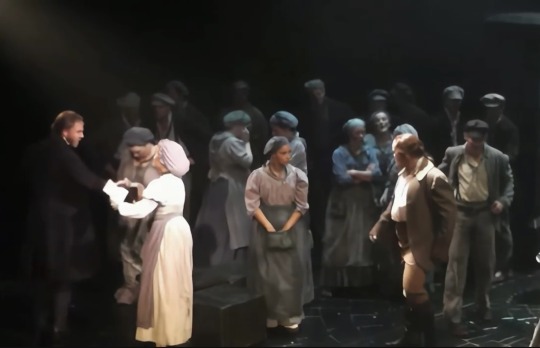
Carrie Hope Fletcher as Eponine!!!
Amazing of course

She’s an icon she’s a legend
a little fall of rain actually hurt my soul so much
She’s such a good actress I will literally shout it from the rooftops

Cosette oh Cosette i cannot speak enough about her
her acting was actually incredible especially in the finale and her face is so expressive I can’t even
this post is just turning into actress appreciation at this point
Marius was such a Little loser this performance

At least he can sing
empty chairs and empty tables broke me
Enjolras had a little bow in his ponytail
Im pretty sure Javert gets a little bow in his hair at some point later as well
but you cannot tell me this is not one of the most Enjolras looking Enjolrases to even Enjolras

He gets all up close and personal with Javert
now for my little Grantaire tangent
i absolutely loved Grantaire in this performance I think this was my favourite portrayal of him ever
he as a really good relationship with Gavroche it’s so cute
When Gavroche is accusing Javert he flings his arms around and almost knocks Grantaire in the face
Grantaire holds onto Gavroche to keep him away from the guns

My sillies
and when Gavroche dies and the set spins to return to the barricade boys the spotlight is on Grantaire as he slowly sits down after witnessing it
:)
After a little fall of rain Enjolras steps forward to speak to Marius but Grantaire steps between them stopping him from getting any closer before comforting Marius
In Drink with me Grantaire tries to (or does I can’t tell) kiss Joly

Then he fucking sobs through his solo and hugs Enjolras who sits him down and takes away his drink

then he REACHES OUT TO ENJOLRAS
i cant do this
and on the Barricade Enjolras runs all the way down from the top to see Grantaire then they both climb back up together
also he’s either wearing eyeliner or it just looks like he’s wearing eyeliner
his actor was just really really good in general
and that is why I love Grantaire thank you for coming to my Ted talk

After the finale battle Javert tried to open the sewer grate then GROWLS ‘Valjean’
like actually
through out the entire show this man is just full on GROWLING

Javert’s soliloquy was a masterpiece genuinely
his transition from the bridge to the ground was so smooth I have no clue how they did that
i mean…he kinda… *gets spritzed with water and starts melting like that witch*

The Thenadiers are like exactly how I pictured them to look
plus they were both real good
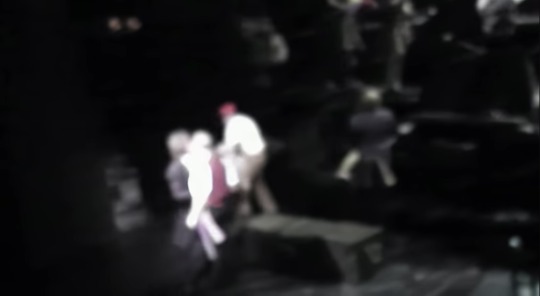
^^Now I know you can’t tell, but this here is a picture of Feuilly holding Enjolras by the waist (it’s canon fr fr)
shout out to this random woman and barricade boy who are being adorable in the background while Marius is lamenting about his sad sad life

time for my lighting nerd moment!
the majority of especially the first part of the performance the stage is like entirely dark with a single spotlight
particularly with individual songs but for like most of the songs that aren’t group songs (red and black or one day more ect)

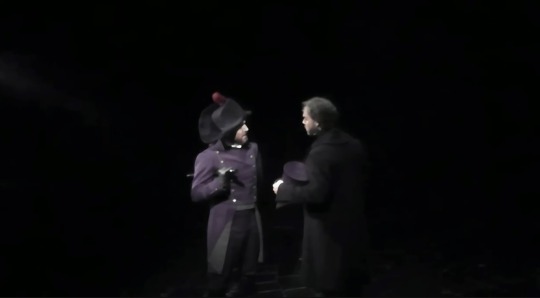

It’s done SO well and looks SO good
it’s very impressive how exact the spotlights are
It feels like this performance is very character focused rather than set
especially because the person filming tends to zoom in on the actors faces to capture their expressions
They make really good use of smoke the whole performance it’s very nice

I like how they used smoke with coloured lighting at the beginning of at the end of the day
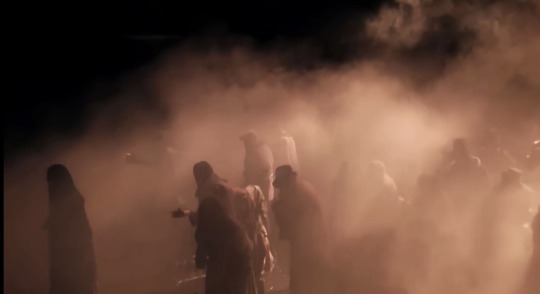
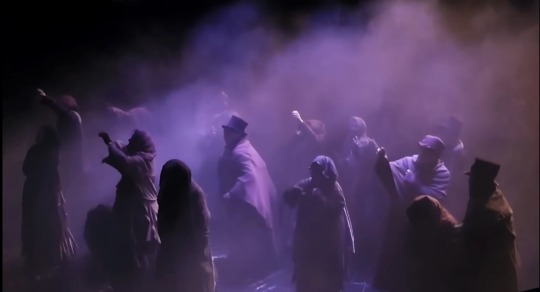
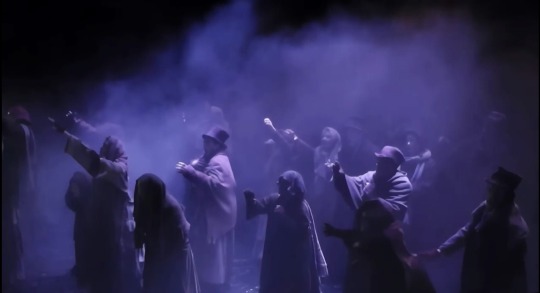
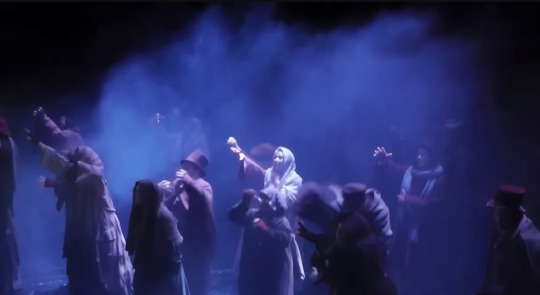
The sequence was very nice
and in the sewers they used a bunch of spotlights to show Valjean and Marius travelling



they also use a grate light for the sewers and dog eats dog which worked really well imo
if you want the full stage the whole time you absolutely will not get that for most of the performance
the person filming is actually pretty good at catching faces
Overall the performance was so incredible
i am very biased so take everything with a grain of salt
but definitely one of, if not my favourite bootleg
now I leave you with two of my favourite screenshots
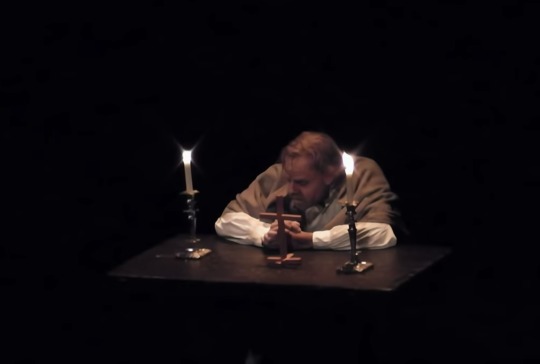

If you have suggestions for other good bootlegs please let me know (YouTube only)
32 notes
·
View notes
Text
My little Tolkien-fic pet-peeve of the day? Writers calling elves, dwarves, or hobbits men or women in their* narration.
"Pippin shaded his eyes, squinting until the sight of the man walking up the road resolved itself into the familiar form of his cousin Merry..."
Hobbit. Just say Hobbit. You don't need to gender everything. Or if you must, then "Hobbit-lad" or "Hobbit-lass" how's that? Or person! Being! Individual! Literally any word that isn't an inaccurate use of the word "man" for someone who is not a man!
"Gimli looked up at the taller man and scoffed at the sight of Legolas's pointed ears, now drooping with dismay..."
See this one just sounds silly, doesn't it? Silly and also confusing! Because you've just called Legolas a man, but clearly you're talking about an elf or he wouldn't have pointed ears, now would he? And Gimli's a dwarf! So why did you say "man" at all? There are no men here! (Unless Aragorn is playing Third Wheel in the background I suppose, but that's neither here-nor-there right now.)
"Glorfindel turned upon the edge of the fountain and greeted the other man with a smile like a sunrise..."
No no no stop, they are not men. Neither of them are men. They're elves. That's kind of a big important plot element in fact, that the Firstborn and the Secondborn are distinct and sundered from one another, please don't call elves men it's weird and awkward and often confusing because then I'll think you're talking about "A Man" but no, you mean an elf but you said man and it's just so off-putting...
They're different species, guys! (This drives me nuts in scifi too. Stop with the humanocentricism! You're not the Galactic Empire!) Replace the word "man" with something else and see how silly it sounds. "Elephant," perhaps; or any other species that isn't the one you're actually talking about.
"Gimli looked up at the taller raccoon and scoffed..."
"Glorfindel greeted the other ant-eater with a smile like a sunrise..."
"The sight of the giraffe walking up the road resolved itself into his cousin Merry..."
See? Yeah, that's how inaccurate it feels to me every time I read the word "man" or "woman" when you're talking about somebody who is not a human. It's not something on the level of squick where I'll reverse out of a fic if I see it, no, but it absolutely is jarring enough to throw-off the rhythm and mood of the story, for me.
(And if I see it in the first line or so before I've gotten invested in the story...yeah. That'll get me out of a fic almost as fast as lack of paragraph-breaking.)
Because I'm such a sucker for world building, I suspect, and the fact that these are all different peoples with different cultures and capabilities and outlooks and understanding and history and everything is such an interesting and important aspect of Middle-earth to me...and lumping all these different folks into one thing like that as though gender is the most important and indeed only notable aspect of their identity, and overrides everything else about them is just weird. It doesn't make sense. And I do not like it.
(Exceptions obviously made for when the character's identity is being deliberately obscured or confused, and they are erroneously thought to be a human and then revealed as something else; that sort of thing is on purpose and thus is fine.)
(Also exceptions for folk like Arwen or Elwing or Elladan etc who straddle the line between species.)
Anyway thank you for coming to this session of Tathrin Whines About Little Things To Avoid Doing Productive Writing Today.
*none of these lines are actual examples taken from real fics; I made them up for this post. Please do not attach call-outs to actual fics or authors in the notes. No need to be mean!
But absolutely fell free to gripe along with me if this silly little world building detail bothers you too. Or laugh at me for being a ridiculous spec-fic nerd. I'm fine with that too!
#squicks#pet peeves#my squicks#lotr fanfiction#writing#fanfiction#fandom#lotr#world building#fantasy world building#elves#dwarves#hobbits
55 notes
·
View notes
Text
ok we are 10 minutes into kollok and i am straight up not having a good time but I am going to commit to this hour of watching. to keep myself from losing it i'm going to do some very irritating stream of consciousness on this post and post it at the end, nonrebloggably so as to not yuck any yums (though feel free to go wild in the replies). also I need to point out: I don't have misophonia. I have openly and repeatedly said I think the Sam Riegel ASMR ad is not just inoffensive, but actively very funny and enjoyable. The sounds on this show are setting my teeth on edge. I hate it. also for the intro the immersion is genuinely WORSE than say, CR or D20 because everyone's just reading prologues that they've written.
speaking of we're done with the prologues to the prologue and into the prologue, as demonstrated by the title screen and horrible noises.

I call this filter the "yeah I've got mild astigmatism and have taken mushrooms before, you're not special"
hmmm we're stuck in this fuckery for a while and i'm suffering so anyway folks i've made it so polygon will think CR is good:

the music is pretty good I will give them that. also this is literally not special though. like Zac just was like uhhhhhh math as any GM would say, he just was weirdly aiming for suaveness instead of like. normal.
All the profanity on this show sounds like a mormon or a ten year old who just learned the word "fuck" and is trying it out. as a woman who swears constantly i'm like what is HAPPENING. also this blonde woman who isn't on the show in the present day is rolling so hilariously badly. is this why she's not on. girl get out.
back to the present day; this actually is a really good industrial music video ruined by some actual play in the background
"zac, I'm going to command attention please"
"who's zac"
"sorry, driver" ah yes yes this is SOOOOOOO much more immersive i'm totally not making the jerk-off motion
i love u danielle radford you deserve better. although the actual RP now that we're in it is like, fine.
really i think a really significant problem is that this is the most 2014 YA-dystopia plot that ever plotted except as a core part of the premise, everyone is 30. I feel, honestly, that this is the other big issue in actual play that people at polygon obsess over that leaves me ice cold, (also? lots of fandom cold takes), but like...I was a HUGE sf nerd pretty much from childhood, and I think a lot of people came to actual play for a number of reasons not tied to the genres in which it typically exists (fantasy, science fiction, horror). This is fine but it means you get people who act like VERY standard genre conventions are either the most brilliant and original creation on earth, or utterly baffling. Anyway my point is that this is giving Divergent by Veronica Roth but it THINKS it's somewhere between Twin Peaks by David Lynch and the adaptation of the Handmaid's Tale and it's like no babe. you're Divergent by Veronica Roth. stop fronting like you're Twin Peaks. You're Divergent. By Veronica Roth. Which I read while stranded at LaGuardia over a decade ago.
lighting effects are fine honestly. reminds me of the Doja Cat 2020 MTV EMA version of Say So. Wish I were just rewatching that. rotating rock i love you. you are the best thing here other than danielle radford. I feel like I'm in a really fancy Spencer's Gifts. by the way I know i'm being pretty bitchy and incoherent here BUT I'm sober; let's hear it for Stupidly Bougie Soda and Nonalcoholic Spirits.
I'm also eating bean dip with a spoon. in my defense I made REALLY good bean dip and I don't have chips.
I just. other than the digital filter in the flashback I genuinely don't see how this is different than D20 except lacking in any charms and OH GOD THAT'S TIME.
but I want to add that like...the thing is Danielle (C-dubbs) was doing some wacky funny stuff and it felt like it was being shut down and to be fair I get wanting to stick WITHIN the genre but this whole thing feels joyless, and not like "oh, survival horror is so grimdark and sad", I am a tragedy enjoyer, but like. it feels...mandated.
Also this is weird and picky but for all of Those High Production Values (repeated direct quote from the Polygon article) they do a weirdly bad job of filming the die rolls? Like, they cut to the dice trays at the wrong time?
Finally, and this is just a pot shot at Polygon but they should stop making it so easy, but the article was like "I watched the 4-ish hour first episode and I didn't have a clue what was going on but it had Those High Production Values" and it's like...I was demonstrably fucking around on tumblr and in GIMP while watching and I have a pretty solid idea of what was going on. Maybe it goes nuts in the remaining 2.5 hours that I may chip away at to be able say I watched a full episode and decided it "wasn't for me" *smiles like I'm a waitress on Hell's Kitchen and Gordon Ramsey just asked me a question* but I think you might be dumb.
CONCLUSION: just watch the Doja Cat 2020 MTV EMA version of Say So, read Divergent (by Veronica Roth) (you don't have to be at LaGuardia) and like, check out Mentopolis or Misfits and Magic if you want to see Danielle Radford in a Kids on Bikes game that is good.
#i am NOT tagging this if you find this via search and are upset i am sorry but simply block me and leave i stand by all the above statements#long post
32 notes
·
View notes
Note
hiiiii tawny I had free time for the first time in like WEEKS and so I caught up on your solangelo au week posts and now for my thoughts:
so american: YES. I LOVE. SO WORTH THE WAIT. NO THOUGHTS HEAD EMPTY THE VIBES WERE VIBING. I read this as soon as it came out so the thoughts have left my head but trust I loved it.
renegades au: omg I love it. v v excited to see where it goes. also may have convinced me that I need to read renegades?? but I love the dynamic that the anarchists have. also I love scientist percy for some reason like it’s def not the easiest power you could’ve went with but I like the idea of him being a more behind-the-scenes guy bc I think that’s what he’d choose for himself if given the chance. also your percabeth dynamics are on point in literally every fic from this week (even tho they’re just in the background lmao).
new rome au: I think this route for nico is like. actually way more plausible than what happened canonically. like he DOES have way more friends in new rome than in chb. dont get me wrong im glad he stayed in canon but this was SO INTERESTING. I love the idea of nico healing on his own and separate from will. I feel like it takes away some of the… unhealthy codependency of their relationship LOL. once again the percabeth dynamics🫶🏻 also I feel like some space from percy and then seeing him while he and annabeth are in college more often would be good for their friendship??? like idk I am a big fan of taking ur space when needed. also risk is SUCH a will song. boy was in love with a dude before they even had a conversation.
nerds au: as a nerd a nerds au is something that can be so special LMAO I love this dynamic perhaps bc it is also my life (esp in hs). all of the character dynamics in this fic were just. chef’s kiss. I loved. I think you translated nico’s unhealthy habits from canon into a hs au in a really interesting, believable way bc nico WOULD stay up late to do hw out of spite. maybe not canon nico but a nico who grew up in the (possible public) school system. also I love the quiz bowl addition (at my hs it was called scholar bowl so sorry if I type that instead LOL) bc I had so much fun in quiz bowl. I made some of my best friends thru it :) are u in quiz bowl?!? the rules were way too accurate to be written by someone unfamiliar with it lol.
long story short I love all ur fics and will forever be excited to see an update to any one of them <3
oh my GOD. you have literally made me die dead. kicking my feet and giggling at this AHHGSDF
i'm SO glad that you liked so american!!!! was highly anticipating ur response bc u convinced me to actually write it so!!!! i'm so happy <33
ABSOLUTELY READ RENEGADES. srsly it's such a good series like i will recommend it to EVERYONE. the anarchists dynamic is so😭😭 keep in mind that this is a heavy au of renegades, so the dynamic is slightly different (+ a very different ending in the series, i took a lot of creative liberties) but i'm so glad that you liked it!! and YESLKSDJF i just realized that i had background percabeth in all of my solangelo week fics. which like. THEYRE SO ICONIC THEY HAVE TO BE EVERYWHERE i think there are some couples that i absolutely LOVE but i prefer to actually write them as background couples?? like i obsess over their dynamics, but i like it from an outsider's perspective and not as the main plotline (at least when writing fics) so i very much enjoyed including them in all of these
honestly SAME with the new rome au. like. absolutely love that nico managed to make a home in chb, but like?? reyna jason AND hazel were all in new rome... i honestly wouldn't have blamed him if he took that opportunity instead!!! i think this would be a really cool au to expand on and like actually make a full multichap but i am trying desperately to not turn everything into 100k monstrosities. i tried limiting myself to 5k words and didn't even manage that so. but i definitely think he would've grown a lot + gotten some healthier coping mechanisms when living with all of his friends, then meeting percy a year later, and THEN going into a relationship with will - and ofc, will is happy with whatever ends with a solangelo endgame. he's their own number one shipper!!
I'M SO GLAD U LIKED THE NERDS AU nico's characterization was definitely something that i considered (and, tbh, that i consider in all au's, because trauma and coping mechanisms do not often translate the exact same over universes - characters are always going to behave slightly different in other situations, so it's always exciting to see how that works!!). one thing that DOES translate throughout every universe is that he has no semblance of a sleep schedule; this time it's just due to hw instead of tartarus nightmares! SAME WITH THE QUIZ BOWL and yes i am part of the club!!! genuinely made my friend group through that, and we actually did what was in the fic irl - as in, we made a discord server and like quizzed each other over that. my team lost be an insane amount. i am nowhere near as skilled as nico and will. i maybe have gotten, like, 4 questions right in my two years of being part of the club (though i will use the excuse that my anxiety makes it VERY hard to hit the buzzer. i hate being wrong more than not answeringslkdf) but!!!! i do think nico and will would SLAY at quiz bowl, they both definitely feel like people who have random encyclopedic knowledge on the most niche topics
THANK YOU SO SO MUCH ILY <333
4 notes
·
View notes
Note
your posts about the nordics are so well written, beautiful and informative, i literally learn something new everyday (and yes i’m saying publicly because I CAN) :') 🩷
especially your posts about sweden/björn. yes, this is his canon name FOR ME, like i love how well you have built him!! i still love canon sweden, but your sverige is… /chef kiss. now, straight to the point: what names or surnames do you recommend for people who are doing/plan to make a human representation for sweden? or like, what are some to do and to do not when representing sweden? just a few months ago i wanted to make my own human representation of sweden, and i called him oskar gustavsson. after reading a little bit more, i decided to change his name to ödhger. i haven’t changed his surname yet
yeah this is such a long ask and sorry for the silly question 😞 anyway, i hope you have a nice day!!
Thank you so much for this ask! No, your question is not silly at all and I love receiving questions like these! I will also try to post at a rate that is closer to learning something new every day instead of every other month :P
Human names I recommend for Sweden: This will change a lot depending on your story's setting, the character's details and your tolerance for inaccuracy. My Sweden is (physically) an average 25-39 year old , upper-middle class Swedish man living in the 21st century. His name is intended to be a rather uncommon, but not unbelievable name for a real person with this background. If your story takes place in a different era or your Sweden belongs to a different social class from mine, the name I use for him could be inappropriate! You can share your Sweden's background and I can give suggestions that way, but beware: I'm not a history nerd.
Among the names you chose, Oskar Gustavsson fits the conditions of my Sweden's name nearly perfectly (the only thing that doesn't match is that it's a very common name - I'm pretty sure that I went to school with this guy), so I prefer it by a big margin. Ödhger on the other hand isn't used in Sweden at all in the modern day, and the only information I can find about it is non-academic sources claiming that it was recorded on runestones. My guess is that it's the Swedish form of the Norwegian name Oddgeir? If that's the background of the name, it would be a Viking-era name, but it wouldn't be used in Sweden in later centuries.
Dos and don'ts for representing Sweden: I don't think I'm the CEO of Sweden who gets to tell other creators what they should and shouldn't do with their characters, so I'll answer this as "Sweden personifications that I like/don't like". The Swedens I don't like are those that have nothing culturally Swedish about them at all, those that could just as well be Venezuela. I'm also not a fan of those that portray Sweden in an extreme and negative way, like as a ruthless warmonger or as a helpless victim of Denmark (as was common in older DenSu fics). On the other hand, I really like it when people have historical and cultural reasons for Sweden's background, character traits and relationships, and I'm always down to hear why they chose to write the character this way. This doesn't mean that everyone ends up with the same character, all of the different interpretations and perspectives will create unique characters.
9 notes
·
View notes
Note
Hi helloo I saw your post about Merlin and I still haven’t made up my mind on whether to watch it and so wanted to get perspective of a kmcg fan on it. Like, I know im gonna be constantly pissed at canon and won’t care that much about merthur, and Morgana is constantly done dirty, so apart from mooning over Katie not much to be excited about. Is there many fan works that do her justice though? I’m kind of afraid that she’s mostly used as a plot device for the gays there as well
okay, so. my relationship with merlin is a curious one because i am liable to go fully off the rails angry at some of the Choices they make, but it’s also my go-to for background noise when i’m doing other things
i came to it very late (finally watched it all during the pandemic) and i will say i was only really there for morgana but she certainly got her claws in me and left her mark for eternity (literally considering the 5 tattoos she alone inspired)
gwen, arthur, and merlin all have their moments where i enjoyed the stories and i thought gwaine was a fun addition when he comes around but it’s all very surface for me
but also, she looks like this so what’s some bad plot in the face of perfection, ya know…


because i went in knowing morgana was ultimately going to be done dirty, i never really invested in morgwen or merthur and as such i’ve never read a fic that’s exclusively for merlin
that being said, i do have three series’ that crossover in some way with supergirl that i will recommend because i never pass on an opportunity to mention them:
Cadentibus Astris by @bibliophile-rhino-nerd
summary of fic one:
King Rodor of Nemeth adopts the two fae children found in his land. Young Kal and Kara grow up in his court as members of his family, along with his daughter Mithian. But now that his children are growing a diplomatic party to their allies in Camelot is in order.
Or the Kara pretends to be the bastard child of a king and ends up being pushed into an arranged marriage with the Lady Morgana fic.
(it’s one of my all time top of the list favorites, i literally started another reread of it this morning, and make it extra fun by picturing the queen of nemeth as brenda strong)
The Once and Future Alien also by @bibliophile-rhino-nerd
summary of fic one:
After helping with the Dominator invasion, Kara's trip home didn't go as planned. Now, stuck in some sort of medieval hell scape without potstickers or her friends; Kara has to find a way home. Only problem is that she doesn't even know exactly where or when she is. The only way to survive and get home is to ask herself, What Would J'onn J'onzz Do? Problem is, he wouldn't run around being a hero, he'd blend in. So what to do when she finds herself in Camelot where things are dangerous, and people need to be protected?
where the heart moves the stone by @jazzfordshire
summary of fic one:
In a desperate attempt to reclaim her throne, Morgana casts a dangerous summoning spell to call for aid. When the call is answered by a woman with no name and an even stranger story (Red Daughter), the façade of vengeance and control that Morgana has cultivated so carefully begins to fall apart.
#this is getting long so i’ll stop here#but personally i’m ultimately happy i watched merlin even tho it is prone to making me angry#the first two series do include a number of storylines from the show but also include enough explanation that you can still get it if you#don’t end up watching#morgana#kara#lena#sc fic rec#sorta#anon#appropriatelyasked#stupidlyanswered
19 notes
·
View notes
Note
regulus for the ask game <3
Omg hi bestie I love u
This ask game
My favourite thing about Regulus Black is that he’s SO clever. Like he’s not smart, he’s not witty, he’s Clever. It’s different. He sees a way around problems other people wouldn’t even BEGIN to think about. Like this is not the kind of cleverness that is taught to someone. It comes from within. It was always present inside of him and he has shaped it and molded it into an instrument. I feel like people get him wrong when they say he’s “sharp as a knife” or whatever. That fucker is a violin.
Least favourite thing about Regulus Black. He has a tendency to think he’s abandoned when he hasn’t been. And I think it hurts him more than it could ever hurt the other people around him, but it still does wound those who care about him.
Favourite Line: I don’t necessarily have a favourite line but my favourite characterization of him is Winterlude by @otrtbs
Brotp: I gotta say him and Dorcas for this one. I think they are ride or dies. There are secrets shared between them that not even Veritaserum could cut out of them. I think it’s a quiet friendship that they share, and an even deadlier loyalty.
OTP: Jegulus, I answered this a bit with James’ post, but for regulus specifically I think he needs James’ love so badly. It’s the good thing he has earned through all the bad.
Notp I Hate Bartylus. I hate it with everything in me. Unless you’re nat I will literally not interact with you about it
Random headxanon: literally uses magic to tie his shoes because he doesn’t know how
Unpopular opinion: I left this fandom for almost a year because I just hated the turn in characterization most people were writing for him. Like HATED it. Made my blood boil. Who is this plucky, razor mouthed, dead inside man. Not my regulus that’s for sure. Like I got so fed up with it because it was just in every fic I turned to and it started to affect my own writing!! And that’s not okay. So now I read jegulus fics just by the people I trust to write him well because I honestly cannot take it. My Regulus is precious. He is a little freak nerd who doesn’t know how to make eye contact with people.
Like I’m making a big deal out of this entirely because the way people began to write him was ENTIRELY too much like my abusive ex which is NOT the writers faults at all but it did mean I had to step away from the fandom for a long time unless I wanted to become a crazy person.
Song I associate with him: I’m sorry I’m gatekeeping (message me privately I’ll answer u probably)
My favourite fanart of him has a bright red background and he’s lighting a cigarette into the mouth of Godric Gryffindor
6 notes
·
View notes
Text
hey important question:
would people actually be interested in reading a fic where wind and legend bond very wholesomely (literally starting out hating each other but then they get really close and it’s adorable) but also i shamelessly explain the entirety of how to celestially navigate in extreme detail?
cuz i just wanted to just have a fun fic where the two bond over both knowing how to navigate, but also each of them gets super disoriented and panicked by one thing they’re not familiar with (time travel, new hemisphere, etc.) and then the other helps them out, and it was gonna be short and simple and straightforward, but that would be incredibly self-indulgent because literally nobody would be able to read it!
like. i want to write this fic. but i could go about this in two ways. one is the inaccessibly self-indulgent way where legend would be like “hey, you can’t get your longitude when you don’t know universal time, and you don’t, because we’ve just time AND space traveled, so our chronometers are completely desynced and the prime meridian is arbitrarily located” and wind would be like “bish, you don’t know ANYTHING—watch me do this lunar distance calculation” and legend would be like “whaaaat? i didn’t know that was a thing” and wind would be like “yeah it’s super hot and sexy but it also requires you having an estimation of your longitude to at least fifteen degrees, and we don’t“ and then legend would be like “so if we just had an estimate of our longitude to fifteen degrees, you’d be good?” and wind would be like “yeah.” and legend would go and figure some stuff out and then come back like “WIND DUDE I GOT IT!!! i did manage to estimate our longitude by taking the magnetic azimuth of rigel during its meridian passage and then using that to calculate the local magnetic variation and cross-referencing THAT against this global variation chart, and by using the latitude we calculated during the noon reduction, we can narrow it down to an area—a relatively broad area, but one we can dramatically narrow down with the lunar distance calculation“ and then wind would be like “woah that’s so clever legend you’re such a genius“ and legend would be like “aw, but i couldn’t have done it without your insane book filled with logarithms that terrifies me to the bone but that you somehow actually know how to use” and wind would be like “dude it’s literally just basic arithmetic, chill,” but legend is hissing like a feral cat and it would be so so fun!!
right, like i think this stuff is SO COOL and it makes me SUPER HAPPY and i wanted to share it in fic form, but that meant making sure people could actually understand what these nerds were talking about without needing to consult a massive explanatory tumblr post, so i was trying to naturally integrate the background information into the dialogue and narration and now i’m thirteen thousand words in and i’m still like “wait, i want to talk about—but first i have to explain—and have i seriously not explained what declination is yet??”
like, i don’t care about this fic being Objectively Good or whatever—there’s a story i want to tell, but i want to tell it in a way people can understand, and that involves explaining my hyperfixation in tons of detail. believe me, i love doing it, i’m just beginning to seriously doubt that anyone is actually going to be able to suffer through this fic and i don’t want to keep going through the effort to explain everything if nobody is actually going to read it except for me, who already knows everything. it’s also really really hard for me to figure out if i’m explaining this stuff well or not because i already understand it and everyone else in my life has had me scream at them about this stuff enough that they know the basics and the terminology.
so, help please!! if you’d wanna read this, please tell me so in the tags (or i guess you could just like the post if you’re shy). if you’d read it, but you don’t actually care if i explain everything and you’d prefer i sacrifice giving you literally any idea what wind and legend are talking about in favor of not wrecking the pacing entirely, please let me know in the notes. if you wanna try beta-reading this thing for comprehensibility, hit me up on discord (@Sky-Squido#4521) and i’ll smack whatever the most recent version of the word doc is and the associated 26d12 psychic damange into your dms.
thanks, guys, and happy new year! i’ll be updating my annual new years fic tonight ^^
32 notes
·
View notes
Note
heyy im so happy i just found your posts about the rook & rose series!! so good to see other people appreciating it, maybe there are more than just 3 of us after all lol 😆 ive only read the first book so far and have the second on hold for a while at my library 😭😭 but glad to hear it only gets better. im so obsessed w the worldbuilding and how the authors built it all from a really thoughtful anthropologist perspective but still kept the characters and plots moving and dynamic btwn the different povs...its really got everything and AGHH now im even more impatient for my hold to come in 😭😭😭 cant wait to see all the stuff you are talking about from the rest of the series and freak out about it even more along with ya!! happy reading!! 😊
YEESSSSSS...... YESSSSSSSSS..... COME OUT OF THE WOODWORK, Y'ALL. COME TO MEEEEEEEEE.
Anyway, yes: my chief Investment in Screaming is re: the OT3, but I really do enjoy the world, and my only minor complaint is that I wish we could have gotten to see more of it (though I do enjoy the use of the city as a character in and of itself). I also enjoy, as you say, the anthropological perspective: the Vraszenians are clearly the Romani, the Liganti are the Romans, there are different languages, cultures, religions, beliefs etc. that inform the story in interesting ways, there is the whole anti-imperial threadline and the Rook being created to hassle the rich colonizers, etc. And the magic system is SUPER unique and interesting to me, as a nerd. Plus all the queer/trans rep in both POV and background characters! And it's never ever a big deal, they're just there and that's it. Bless.
Also.... is Vargo my favorite? You mean the bisexual trash disaster sassy garbage man who literally blows things up and is a crime lord turned nobleman but still garbage and also secretly a giant softie who will do anything for his wife and then his husband? Do you. Do you. Do you even really need to ask. OF COURSE HE IS MY FAVORITE, BECAUSE I AM PREDICTABLE IN THIS FASHION.
ANYWAY: yes, yessssss. Yesssss. I am delighted by all y'all appearing out of nowhere and/or being converted to my nefarious OT3 agenda through the sheer strength of my capslock screaming about books you have never previously heard of. Bless.
13 notes
·
View notes
Text
Why You Should Vote For Taliyah In The Pink Mahou Poll
I present to you: my daughter

For those who weren't there to put up with my incessant Star Guardian posting during the Star Guardian event of 2022, Taliyah is a League of Legends character who has a skin in the Star Guardian skin line, which is a magical girl au. Regular Taliyah and Star Guardian Taliyah are characters in different universes, but regular Taliyah is the base character so context about her is important!

Taliyah was released in 2016, and she was a unique addition to the champion roster as one of the very few female characters to have distinct facial features. She's a mage with the title of 'stoneweaver' as her powers allow her to essentially be an earthbender (to my understanding, I've never watched ATLA) and she makes rocky waves which she surfs along! She's a kind and caring person who values community and protecting those you call family. She's a teenager in the game and her lore on release, but by the time of the most recent story she's been in, she's in her early twenties.
The writers and artists at Riot who designed Taliyah originally intended for her to be trans. But this was before Riot started allowing their characters to be canonically queer (they've got a handful of gay champs now but still no trans champions), so it did not happen. Since then, there's been a lot of little hints here and there for queer people to pick up on, and she feels very trans coded.

Which Brings me to Star Guardian Taliyah! Star Guardians are a skin line in the game that was popular enough to get some story content.
I have a long comprehensive guide to Star Guardian media here that I made during the most recent Star Guardian event! Read it if you might have an interest in Star Guardians, but it's not needed to appreciate Taliyah.
Taliyah in this universe is a teenage magical girl who is shy and meek at school, but when transformed she finds confidence within herself. She feels more like herself in her magical outfit than she does without it, and her storyline is about finding how to discover and express her true self.
She's also a nerd who likes going to maid cafes and is a very competitive gamer!
During the event, Riot released a playlist in collaboration with various artists, with Star Guardian Taliyah being the face of it. Put it on in the background sometime if you like chill, cute study music and that sort of stuff. More Importantly, Taliyah is animated through the whole video (along with Star Nemesis Fiddlesticks) and she does a cute little dance. Please look at her dance.
youtube
In conclusion:
Pros of voting for Taliyah:
Every vote for Taliyah is a vote for trans rights
She is literally the cutest
It would make me very happy if she made it through even a single round <3
Cons of voting for Taliyah:
League of Legends sucks - yeah I can't argue with that, but consider that she is too good to be confined by the toxic game, and the actual artists behind her creation care a whole lot about her!

#millie.txt#polls#i love star guardian taliyah because the specific way she's trans coded#is the same way i feel about magical star#the idea of one's gender expression being tied to a magical girl transformation is one of my favourite things ever#Youtube
16 notes
·
View notes
Text
Next up on a tsats post I read got me thinking: Will Solace again
Because (again) good stuff in tsats got lost in the repetativeness of this book. Someone pointed out that Will's character wasn't changed, people just think he's calm and collected on the outside and in this book we see his pov and see him with someone he's closer/more vulnerable with, and dude is riddled with anxiety that he hides. And like..... yes. Yeah. That's it. That's literally it.
Being calm and collected and bossy in his element and completely petrified outside of it? Real for the medic who's great plan in the Seige on Camp Half-Blood being to run/get chased (and do the demigod art of insultsTM) Feeling like shit to be taken care of and thinking yourself useless because of it? So real for a medic who has previously bemoaned his lesser musical ability and combat abilities, who is now unable to do the one thing he IS good at
Personal bias here but I am called the "chill one" in my family. My dad says it almost constantly (especially in comparison to my siblings) that I'm more relaxed and don't get all anxious and have it under control and just don't sweat it. I'm not as academically smart as my siblings or anything and my relaxed nature is the number one thing that gets noticed about me
But I'm not
I am scared all the time. I feel sick to my literal stomach with anxiety multiple times a month going to bed or waking up because of.... life. Do I let a single person know that? God no. What if they need me? I live a good life all things considered, how could I ever compare the small shit I go through to someone's break up or family trauma or depressive episode?(Got a little bit of the "i'm not diagnosed so I'm invalid" thing going on) How could I ever put my needs on the front burner when I need to help people or spend time with them at their beck and call.
One of the other things I'm called/get compared to is a Therapy Dog. Because people find me comforting to be around - I listen and do my best to help - I am a friendly face.
I have literally told myself some days where life just keeps coming at me that I won't cover it up and I will actually look sad. I repeatedly tell myself to do it, and then the instant - the very second - i'm in front of someone I feel it naturally pack itself into the back of my mind and feel a smile pull at my lips. I literally can't do it. I don't want to worry them, I don't want to disuade them from telling me something because I look sad.
I think about the way my failures will impact everyone else but me. Like right now I think I'm gonna fail a course and it frightens me, but my priority is my mother who is stressed from family issues and my dad who trusted me - how my grades will worsen their lives. I'm like that for everything.
Basically, if I can't make people feel better, what good am I? What good am I TO THEM?
So Will Solace. I've always really liked him and related myself to him - even from Last Olympian, believe it or not. The brief moments with him back then had him be that random background character I latched onto. And then there was HOO (and later TOA) and I loved him even more. Partly because I could see him sharing opinions I do, but they weren't completely unfounded, but still his chill-ish nature and lack of other godly talents other than healing resonated with me. And then in tsats I remember several times going "bro he's literally me somehow". Somehow, being the key word, because even though I didn't think he was too different, since we didn't have much content of him before, I could still recognize a sort of shift. And this post I saw made me realize what it was:
He is the "chill one" - he is the "therapy dog". He knows how to take care of people and he likes nerd shit, and outside of that he is scared. He hates being taken care of because it makes him feel useless. He's worried he's loving/caring wrong and that it will lose him people - lose Nico. And we see it now because we get his thoughts - we see him completely out of his element with someone he's far closer to and can let his walls fall a bit, but still not completely. He's being unravelled by the Underworld and tries to downplay it. He's just like me fr.
#his character isn't different - it's weirdly more fleshed out#tsats#tsats potential spoilers#will solace
10 notes
·
View notes
Note
*harass harass* Tell me about the buddhism books you've been reading caelummmmm. Tell me how they intersect with ATLA and your thoughts on EBWF
*sweats*
So the more I read about Eastern Philosophy, the more I realize I'll probably never fully grasp it, lol. Ironically I think Buddhism's answer to this realization is "Yes, that's the POINT."
I'll be honest - I'm not reading anything overly academic or deep. I needed to get in on the ground level of understanding, so I literally read through Buddhism for Dummies, Taoism for Dummies, and Hinduism for Dummies. All three were very interesting and informative!
For me, trying to understand Buddhism is kinda like trying to hold smoke, my hands are in it but I can't seem to grasp it. I feel like I get it when I'm reading about it but once I put the book down the concept just eludes me. (If anyone's got any reading suggestions for understanding Buddhist philosophy, feel free to rec them to me!)
One thing that stuck out to me, though - the Three Jewels. The Three Jewels (Buddha, Dharma, and Sangha, or the teacher, his teachings, and the spiritual community) are a pretty important part of Buddhism, which means they ought to be a pretty important part of Air Nomad culture as well. I'm guessing there should be some sort of Buddha-like enlightened teacher figure in the Air Nomads' distant past... Also there's so many different schools of Buddhism, makes me wonder at the differences there must've been between Air Temples.
Also the fact that these things are called the Three Jewels, and we have the Feanorions, who are also related to three jewels...idk, I just find that funny.
There's also the whole concept of a finger pointing at the moon, or the word used to describe something is not the something itself, and...well, elves are word nerds, so I feel like there's gonna be some interesting conversation around that at some point.
I really enjoyed learning about Hinduism. Growing up, India as a concept was basically "that place where we send missionaries", so it was nice to finally, like, learn about Hinduism on its own terms without that Sunday School overlay. It was a little hard to wrap my head around some of the concepts with the avatars and how all the gods are manifestations of the main gods and it really takes the concept of "everything is connected" to a whole other level, but it was really cool stuff!
Taoism was pretty cool to learn about too, but I can't remember any specifics right now.
...And I haven't gone any deeper into any of this yet because I took a tangent and dove into Tibetan history. I wanted to read Prisoners of Shangri-La by Donald S. Lopez Jr. because it was recommended in this post, but the point of that book is to deconstruct the harm done by Orientalism and Tibetan stereotypes, and I very quickly realized I had no idea what any of these Orientalist Tibetan stereotypes it was talking about were, so I went and read Tibet: A History by Sam Van Schaik to get a better grasp of the background. It helped a lot, and I started on Prisoners of Shangri-La again, but then a library book I requested a month ago finally came in, so everything's been put on hold while I read about how the 1920s Florida real estate boom led to the Great Depression. ¯\_(ツ)_/¯
12 notes
·
View notes
Text
My mom is the type who was a cheerleader (both in high school and professionally for a short period for a local football team) and would scream-cheer at any sports game she attends. She was super popular and fashionable in high school and has a degree in economics. She has worn makeup since she was ten.
Perhaps intended to be the moment her villain arc began, she had three daughters who do not share these interests. She described us, in her own words, as "being into that nerd shit." To illustrate this, we would raptly watch a show on Canadian television called "How It's Made" which would run through the manufacture of any number of items each episode with a gentle narration. We would literally run to watch this show.
We are also all neurodivergent (though I am convinced our mother is too). So, yes - villain origin material if I have ever seen it.
But she raised us really well, and we never once felt that we couldn't tell her about things we were interested in. We were really close when we were kids and just as close now we're all adults.
I know this is a silly post, but I have a genuine answer to the question under the cut. Feel free to ignore it.
Her success at having kids who had such drastically different personalities came from a combination of things: honesty, indulgence, listening, incorporation, inquiry, sharing and boundaries.
So, my mom started by indulging us in things we wanted to do as little kids, especially things she also liked to do. For instance, if she was painting a room or a mural (she always wanted to be an artist and is really good at it), she would buy cheap watercolour paints from the dollar store and let us paint over old newpaper in the same room as her. Even though she wasn't doing it with us, we were still included in what she was doing.
As we got older, she would include us in chores she was doing (we would "swim" in the clean laundry after our baths while she ran loads, and she would dump new stuff from the dryer over our heads) and would tell us about stuff she liked. She was constantly redecorating and repainting, so she would ask us to pick out colour tiles in the hardware store that we liked and bring them to her (even though she never used them). If it was for our own rooms, she would come to a compromise with us on the colour (one we liked that she could live with). She would ask our opinions about innocuous thinga like drape length or the colour/style of curtain rods despite the fact we did not give a damn.
As we got older, this would progress into us sharing more extensive interests, like gaming and books. She would take us to retailers to look at stuff even if we didn't buy anything, but she would let us talk her ear off about stuff. She would let us choose shows to watch or play games on the main tv to "have something on in the background" and just absorb details by osmosis. In fact, she got into Death Note because she was painting the living room while my sisters were watching it and got invested. She still asks to finish it every couple months.
She encouraged us to pursue our own interests and do the things we liked. I spent a lot of my preteen and teen years reading fantasy books and non-fiction about Ancient Egypt and Greece. Who knows how many hours of her life I've taken up rambling about ancient Mediterranean societies (which is my major now, but I digress) or mermaids and dragons. She would tell us, when we could tell she didn't get it or wasn't interested, that "it doesn't matter whether or not I like it - you do, and it makes me happy to hear you talk about something you love."
And lastly, she never pretended something was more interesting to her than it was, and she was gentle but firm when she had had enough. For instance, my middle sister is im school for medicine and comes home with cool and gross facts about the human body, diseases and such a lot. My mom will listen to the more clinical details (this muscle connects here, which does this, etc) but draws the line at things she finds upsetting or just gross. She will cut us off or wave her hands and be done with discussing something. We can do the same back to her if she's discussing something we no longer want to talk about.
That's the key - mutual standards. Both parent and kid exchanged interests and understood/were taught that there is value in engaging with the other's interests even if they are boring. We would spend time together, even if it was doing different things, and let each other have separate interests without judgement. We can also disengage if we're really uncomfortable or not interested.
I couldn’t have kids because what if I didn’t vibe with the kid. What if the nerd genes somehow passed them and they were really into sports and I had to sit at the ballpark in 85° weather and watch them swing at a baseball over and over again? What if they really liked Disney and their favorite Disney princess was one of the really boring ones? What if they grew up to be an investment banker and expected me to listen to them talk about their job and be proud? I’d still love them I’m sure but I think wasting years of my life entertaining my normcore child would be so sad. I don’t think these things would happen because I think I’m only capable of spawning freaks but I’m not going to tempt fate. My parents are so lucky that I like classic literature, antiques, cheesy movies and history just like them. What if I had been normal? Nightmare.
519 notes
·
View notes
Text
Techno posted some more in his discord! (Read bottom to top.)







[Image ID:
Several cropped screenshots of Discord messages by Techno.
#dream-smp-discussion
Techno: “bruh who leaked this”, in reply to Prosecutor Wolfhandler saying “harpocrates is manatreed /j”.
Techno: “years of lore planning down the drain”.
Techno: “i actually want to stream but the door to my room was removed so my wheelchair could fit and my entire family is stuck at home and Loud”, in reply to Mastrr saying “Hey techno, while your active you should stream”.
Techno: “usually id just leave and stream somewhere else but that would require the ability to climb stairs”.
Techno: “background noise gon be like HEY TECHNO UR SOCIAL SECURITY NUMBER'S STILL XXXXXXXX RIGHT”, in reply to Prosecutor Wolfhandler saying “don't worry, the background noise is just bonus content to us”.
Techno: “ok i just tried a new method and i safely ascended a set of stairs by sitting down and pushing myself up backwards one step at a time”.
Techno: “now to figure out how to go down stairs... hmm...”
Techno: “listen, when my discord messages inevitably get screenshotted and posted on some update account i cant have ppl seeing me swear. it's OFF-BRAND”, in reply to faber saying “did he really edit "wtf" to “bruh" after a while Imao”.
Techno: “i've never said that in my life. that doesn't even sound like me at all”, in reply to FinnTheHuman saying “Techno you literally said you preferred your babies boneless here before the purge why...”
Techno: “i bet i can ban you faster than you can post screenshots”, in reply to FinnTheHuman saying “Brb”.
Techno: “:technounit:”.
Techno: “was this that time i needed ppl to help me train in 1.9 pvp and you guys were like "we can help we're experts" and then you joined my realm and started getting folded”.
Techno: “:technolaugh:”.
Techno: “emote creators are exempt from taxes”, in reply to rhen saying “i have a genuine question of why techno went to my profile to give me emote creator while i was still a white name”.
Techno: “what have i done. you were king pig too NOOOO”, in reply to FinnTheHuman saying “I CAN TAX EVADE TOO LETS GOOOO”.
#video-discussion
Techno: “my bad”.
Techno: “i increased slowmode there to 6 hours. watch them come crawling back”, in reply to himself saying “my bad”.
#dream-smp-discussion
Techno: [attached is a nerd/virgin vs chad meme, with the crying nerd labeled “DSMP Fans” and the chad labeled “Greek Mythology Fans”. Under both is a screenshot of a twitter post, cropped so as to not show the name of the poster. The one under the nerd reads “GUYS YOU’VE BEEN DISCUSSING THE SAME LORE FOR AN ENTIRE YEAR IF I SEE ANOTHER DOOMSDAY TAKE I AM GOING TO BECOME THE JOKER”. The one under the chad reads “why c!odysseus was actually the one responsible for the trojan war, a thread [1/36]”.]
Techno: “c!odysseus did nothing wrong dude. you better not be some kinda clparis apologist”.
#video-discussion
Techno: “alright ill turn off slowmode there for 15 seconds but then im turning it back on so if you dont reset ur 6 hours in time dont blame me”.
Techno: “what if i just leave it off does it work then“.
Techno: “well it's working for other people so maybe you just have too many bones idk”.
#dream-smp-discussion
Techno: “streamer: has mic muted by accident character analysts: it's essay time”.
Techno: “gonna post my meme on reddit for free upvotes”.
Techno: “i dont understand how reddit works. it just made me give my post a Flair?? sounds made up”.
End ID]
#technoblade#mcyt#image id#no id in alt text#monkaW I have been called out#alas i wasn’t actually fast enough to catch that KEKW#peeposmile definitely no one saw the version where i forgot to crop one of these properly
620 notes
·
View notes